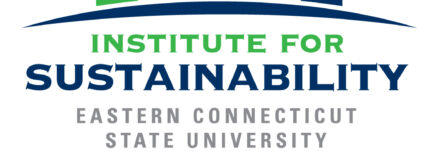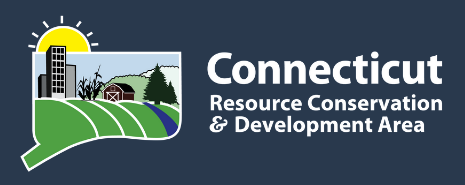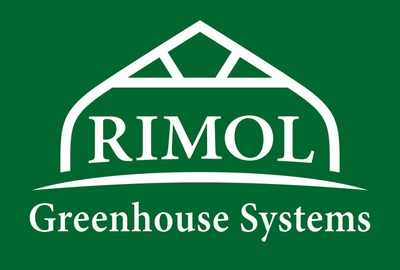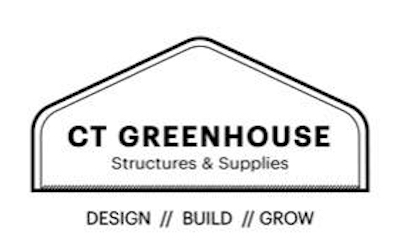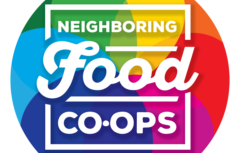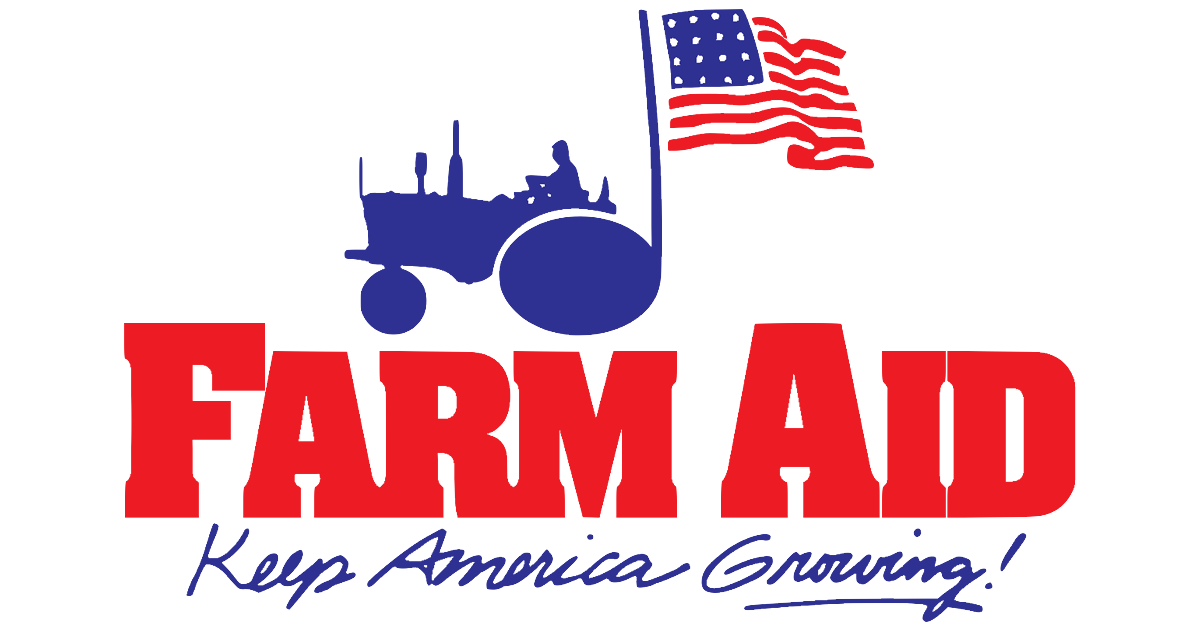
Workshops
Workshop details
march 20 (Online)
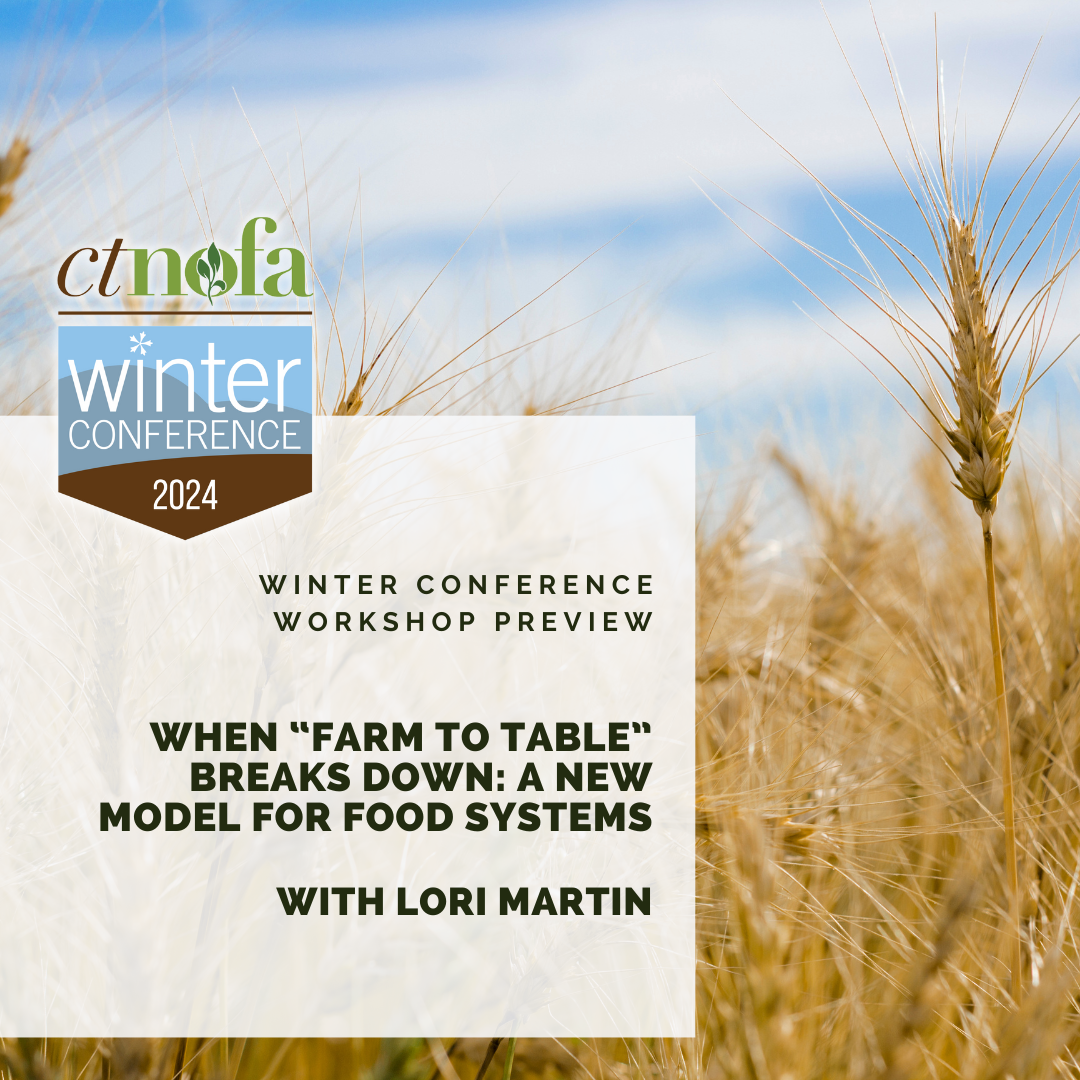
When “Farm to Table” Breaks Down: A New Model For Food Systems
9:00 AM
Lori Martin
Tracks: Food Justice/Food Security
Historically, food systems in the U.S. have placed yield and profit above environmental health, nutrition, and human rights. Food Rescue organizations such as Haven’s Harvest are at the intersection of food insecurity, environmental issues, and social justice—we work to distribute good food that would otherwise be put into our waste streams where it would produce enormous amounts of greenhouse gases—and transport it hyper-locally to organizations that make it easier for people with food insecurity to access it. We rely on a large volunteer corps to use an app to quickly “rescue” the food when it’s about to be tossed, and drive it to senior centers, daycare centers, schools, faith-based organizations, affordable housing units, and other places where there may be food insecurity. While we focus on proteins and perishable, prepared foods, we also rescue vast amounts of good, edible produce from grocery stores and farmer’s markets. This workshop will dive deeper into our model and share some ways we hope to partner with Connecticut’s farmers.
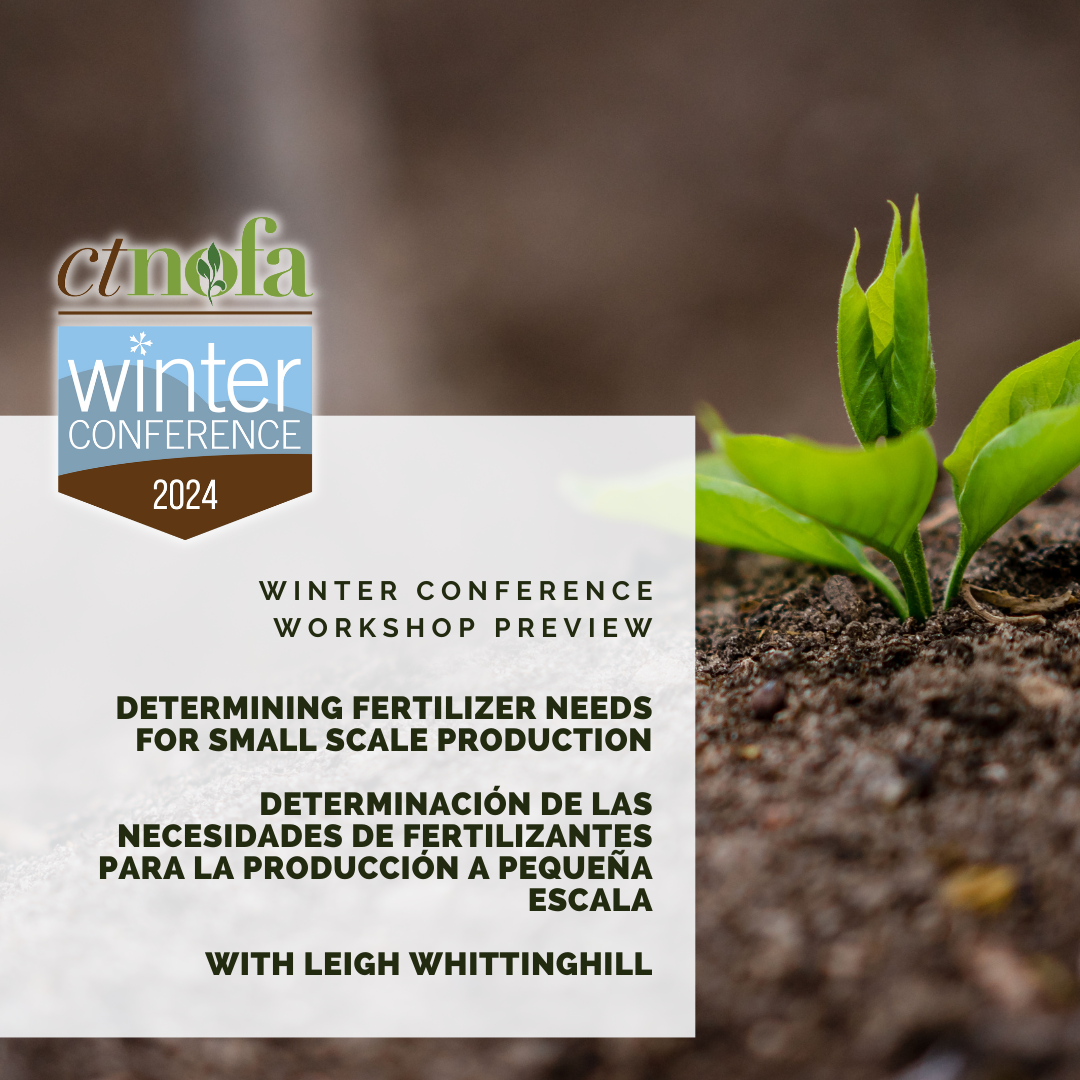
Determining Fertilizer Needs For Small Scale Production / Determinación de las necesidades de fertilizantes para la producción a pequeña escala
9:00 AM
DR. LEIGH WHITTINGHILL
Tracks: Beginning Farmer, Homesteader/Home Gardener
Careful application of nutrients to meet crop needs is important not only for successful production, but also to minimize negative environmental impacts. Inadequate application of nutrients can cause stress to plants resulting in greater susceptibility to pests and diseases, decreased production, and ultimately loss of income. Excessive nutrient applications can lead to additional farm expenses, nutrient leaching, and downstream water quality issues such as eutrophication. Managing nutrient applications accurately can, however, be challenging for beginning farmers and growers, and those producing crops in smaller areas. A worksheet has been developed to help such farmers and growers navigate these challenges. The worksheet walks the user through determining their growing area for each crop, using tools such as the New England Vegetable Management Guide to determine the nutrient recommendations for each crop, converting those recommendations to a scale appropriate to their farm or garden, and then determining how much amendment or fertilizer is needed to supply those nutrients. This can also be used to determine how much of each nutrient source should be purchased for the growing season. The tables a farmer or grower creates by completing this worksheet can easily be incorporated into their farm or garden record keeping.
La aplicación cuidadosa de nutrientes para satisfacer las necesidades de los cultivos es importante no sólo para una producción exitosa, si no también para minimizar los impactos ambientales negativos. La aplicación inadecuada de nutrientes puede causar estrés a las plantas, lo que resulta en una mayor susceptibilidad a plagas y enfermedades, una disminución de la producción y, en última instancia, una pérdida de ingresos. Las aplicaciones excesivas de nutrientes pueden generar gastos agrícolas adicionales, lixiviación de nutrientes y problemas de calidad del agua , como la eutrofización. Sin embargo, gestionar con precisión las aplicaciones de nutrientes puede ser un desafío para los agricultores y cultivadores principiantes y para aquellos que producen cultivos en áreas más pequeñas. Se ha desarrollado una hoja de trabajo para ayudar a dichos agricultores y productores a superar estos desafíos. La hoja de trabajo guía al usuario sirve para determinar su área de cultivo para cada cultivo, utilizando herramientas como la Guía de Manejo de Vegetales de Nueva Inglaterra para determinar las recomendaciones de nutrientes para cada cultivo, convirtiendo esas recomendaciones a una escala apropiada para su granja o jardín, y luego determinando cómo Se necesita mucha enmienda o fertilizante para suministrar esos nutrientes. Esto también se puede utilizar para determinar qué cantidad de cada fuente de nutrientes se debe comprar para la temporada de crecimiento. Las tablas que un agricultor crea al completar esta hoja de trabajo se pueden incorporar fácilmente al mantenimiento de registros de su granja o jardín.
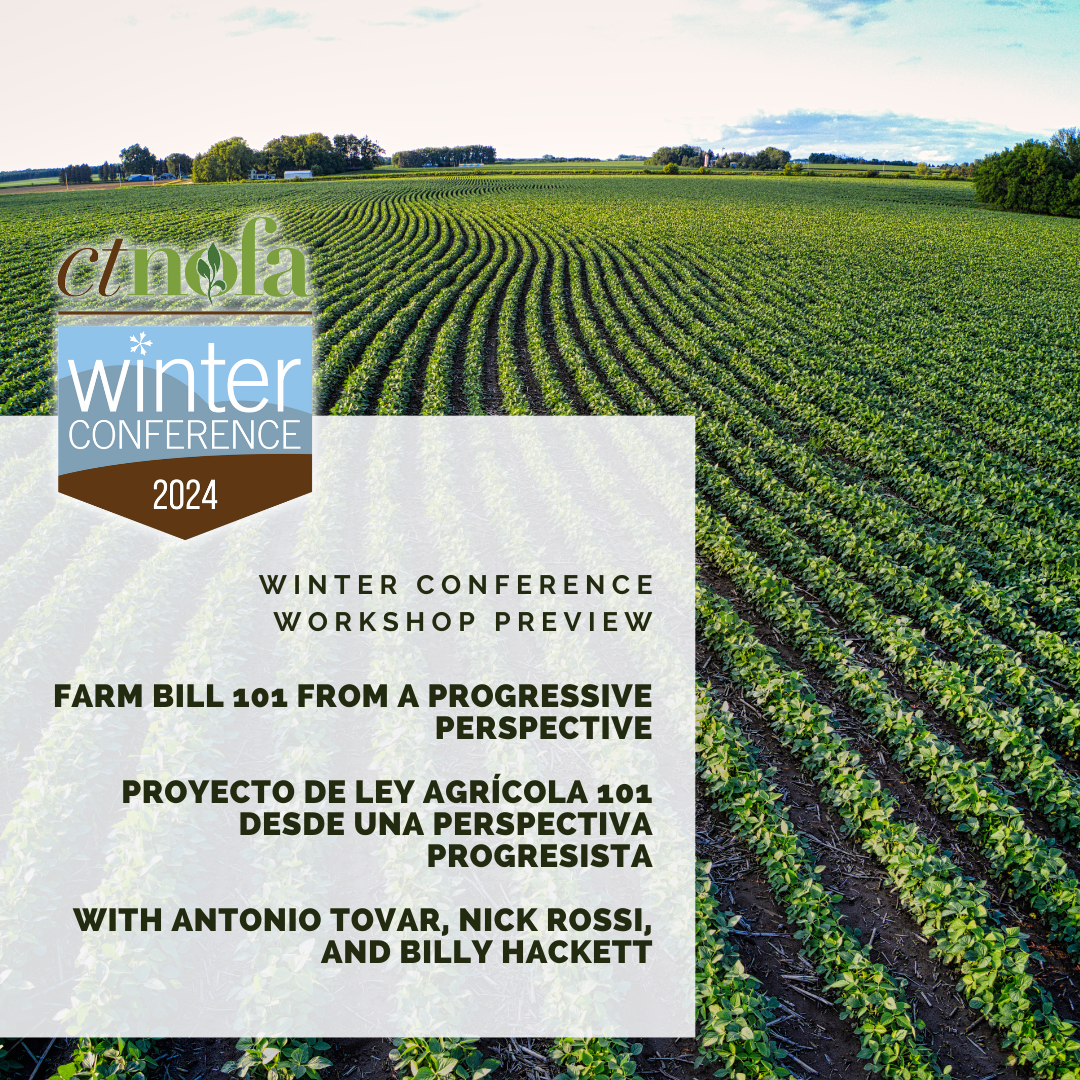
Farm Bill 101 from a Progressive Perspective / Proyecto de Ley Agrícola 101 desde una perspectiva progresista
12:00 PM
ANTONIO TOVAR, NICK ROSSI, and BILLY HACKETT
Tracks: Policy and Advocacy
Big Ag and structurally problematic farm policy continue to undermine family farms and ranches, leading to the drastic loss of generational wealth, depressed rural communities, and a highly concentrated food and farm system vulnerable to disruption—problems largely ignored by Congress and government agencies. The Farm Bill opens an important opportunity to reverse these trends and ensure good food for all, prosperous local economies, and healthy ecosystems. The National Family Farm Coalition, the National Sustainable Agriculture Coalition, and the National Young Farmers Coalition will offer a basic overview of the Farm Bill, the current stage of the process, and their priorities for this bill.
Las grandes empresas agrícolas y las políticas agrícolas estructuralmente problemáticas continúan socavando las granjas y ranchos familiares, lo que lleva a una pérdida drástica de riqueza generacional, comunidades rurales deprimidas y un sistema alimentario y agrícola altamente concentrado y vulnerable a la interrupción , problemas en gran medida ignorados por el Congreso y las agencias gubernamentales. La Ley Agrícola abre una oportunidad importante para revertir estas tendencias y garantizar una buena alimentación para todos, economías locales prósperas y ecosistemas saludables. La Coalición Nacional de Agricultura Familiar, la Coalición Nacional de Agricultura Sostenible y la Coalición Nacional de Jóvenes Agricultores ofrecerán una descripción básica del Proyecto de Ley Agrícola, la etapa actual del proceso y sus prioridades para este proyecto de ley.

Strategic Collective Communications: Moving Beyond Promotion and Making Time For Narrative Building
12:00 PM
SHANE ROGERS and CHRISTINE TYLER HILL
Tracks: Policy and Advocacy, Food Justice/Food Security
Changing the way people think about food and farming requires cultural change, which relies on stories, education, and sharing new narratives about how the food system – and the future at large – can look. But…where is the time?! If food system communicators are overwhelmed by the volume of events, fundraisers, programs, and application deadlines to promote, how can they make time for developing and sharing the stories and narratives that are critical for driving the systemic change we so desperately need? In this session we’ll define narrative building in the context of systems change, share examples of what narrative building looks like, and share tools and resources for funding and integrating narrative building into your marketing work.
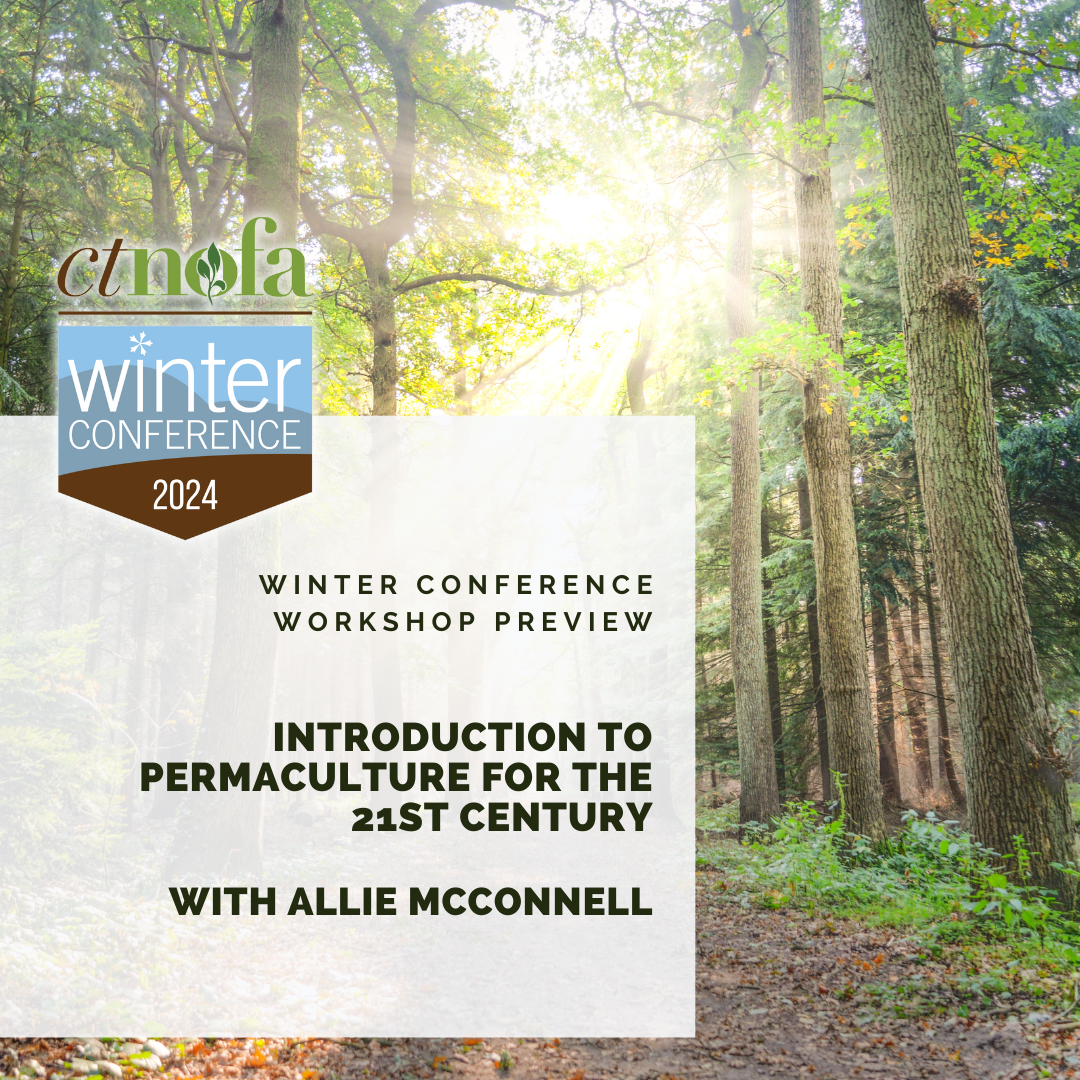
Introduction To Permaculture For The 21st Century
3:00 PM
Allie McConnell
Tracks: Beginning Farmer, Organic Land Care, Homesteader/Home Gardener, Food Justice/Food Security
Attend this talk to learn about how permaculture practice can help us in the 21st century. We’ll start with a quick review of historical context before we delve into what permaculture is and is not. Throughout, we’ll emphasize how this practice of system design can help us meet and mitigate the ecological and social challenges of our time through the ways we steward our land and built environments.
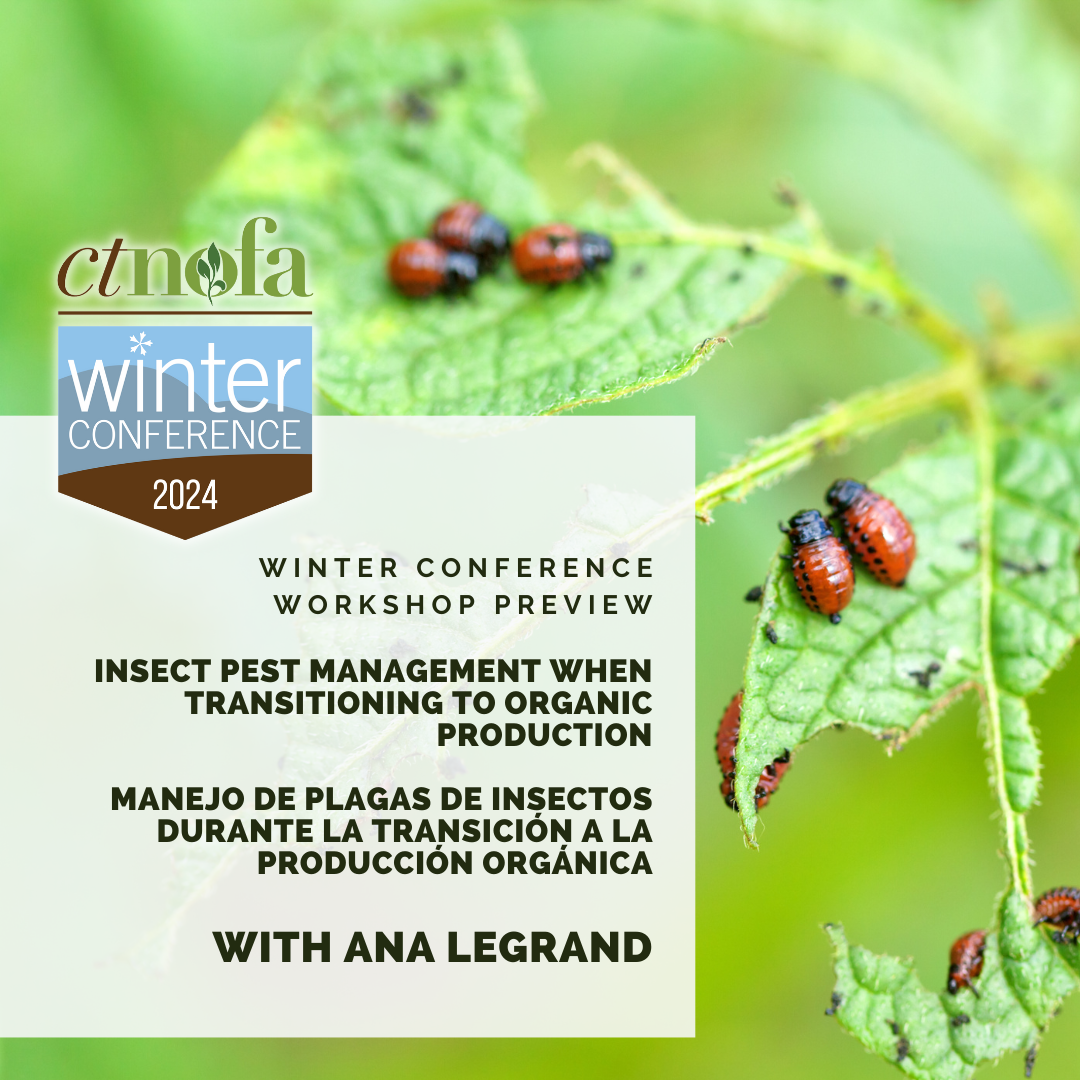
Insect Pest Management When Transitioning to Organic Production / Manejo de plagas de insectos durante la transición a la producción orgánica
3:00 PM
DR. ANA LEGRAND | University of Connecticut
Tracks: Transition to Organic Farming, Beginning Farmer, Homesteader/Home Gardener
This workshop will cover key planning elements for successful pest management when transitioning from conventional to organic systems. The focus will be on vegetable systems and topics will include review of National Organic Program expectations, strategies to build a strong beneficial insect community, preventive non-chemical tools, and planning for specific pests including the use of OMRI-listed materials.
Este taller cubrirá elementos clave de planificación para un manejo exitoso de plagas al realizar la transición de sistemas convencionales a orgánicos. La atención se centrará en los sistemas vegetales y los temas incluirán una revisión de las expectativas del Programa Orgánico Nacional, estrategias para construir una fuerte comunidad de insectos beneficiosos, herramientas preventivas no químicas y planificación para plagas específicas, incluido el uso de materiales incluidos en la lista de OMRI.
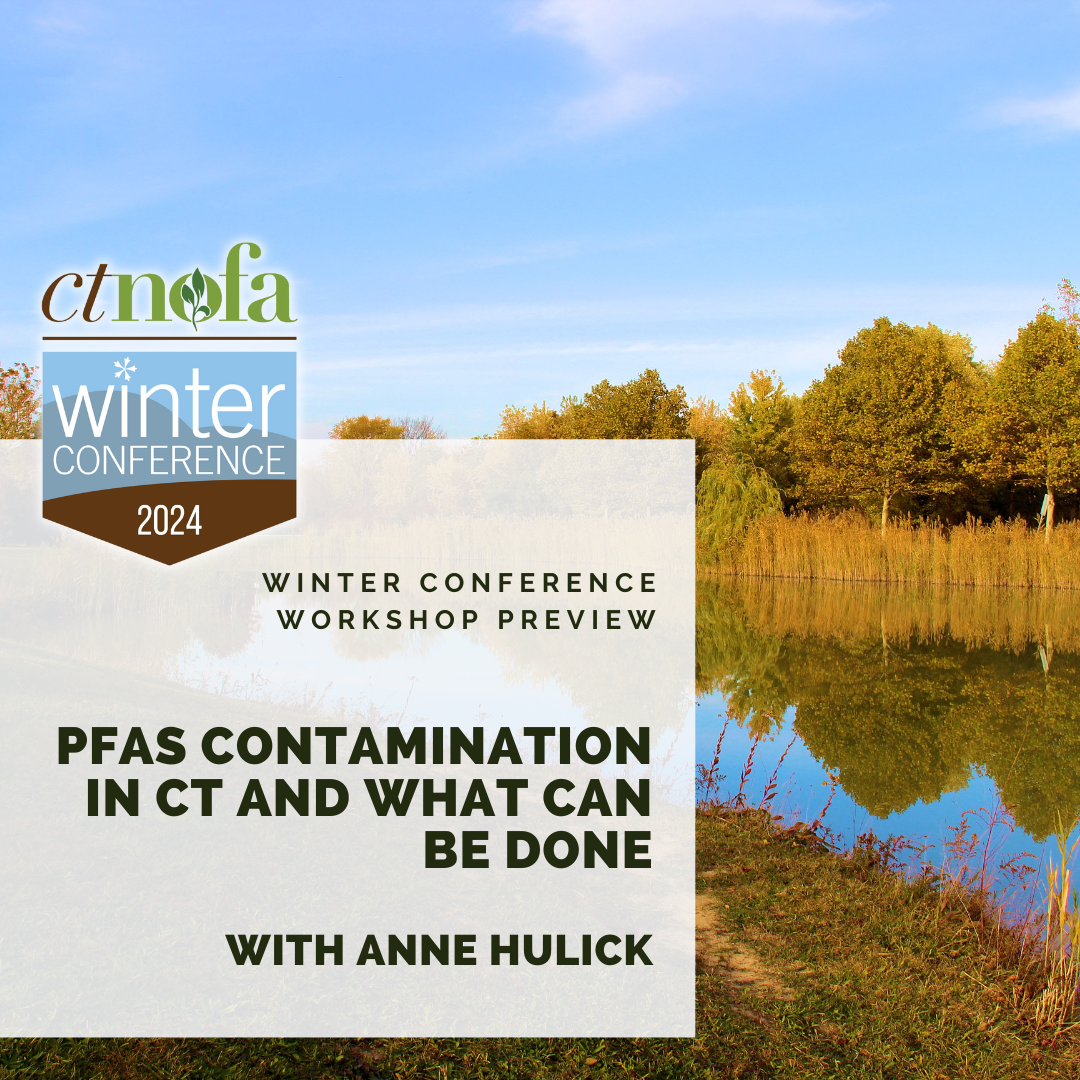
PFAS Contamination in CT and What Can Be Done
3:00 PM
ANNE HULICK | Clean Water Action Fund
Tracks: Policy and Advocacy
This workshop will include an overview of PFAS chemicals and their impact on health and the environment, particularly the impact to farms. Participants will learn about how sludge has been a major source of contamination across the country, as well as current issues in CT, and hear about state action to identify and remediate contaminated sites. We’ll also discuss policy actions to reduce further contamination.
March 21 (online)
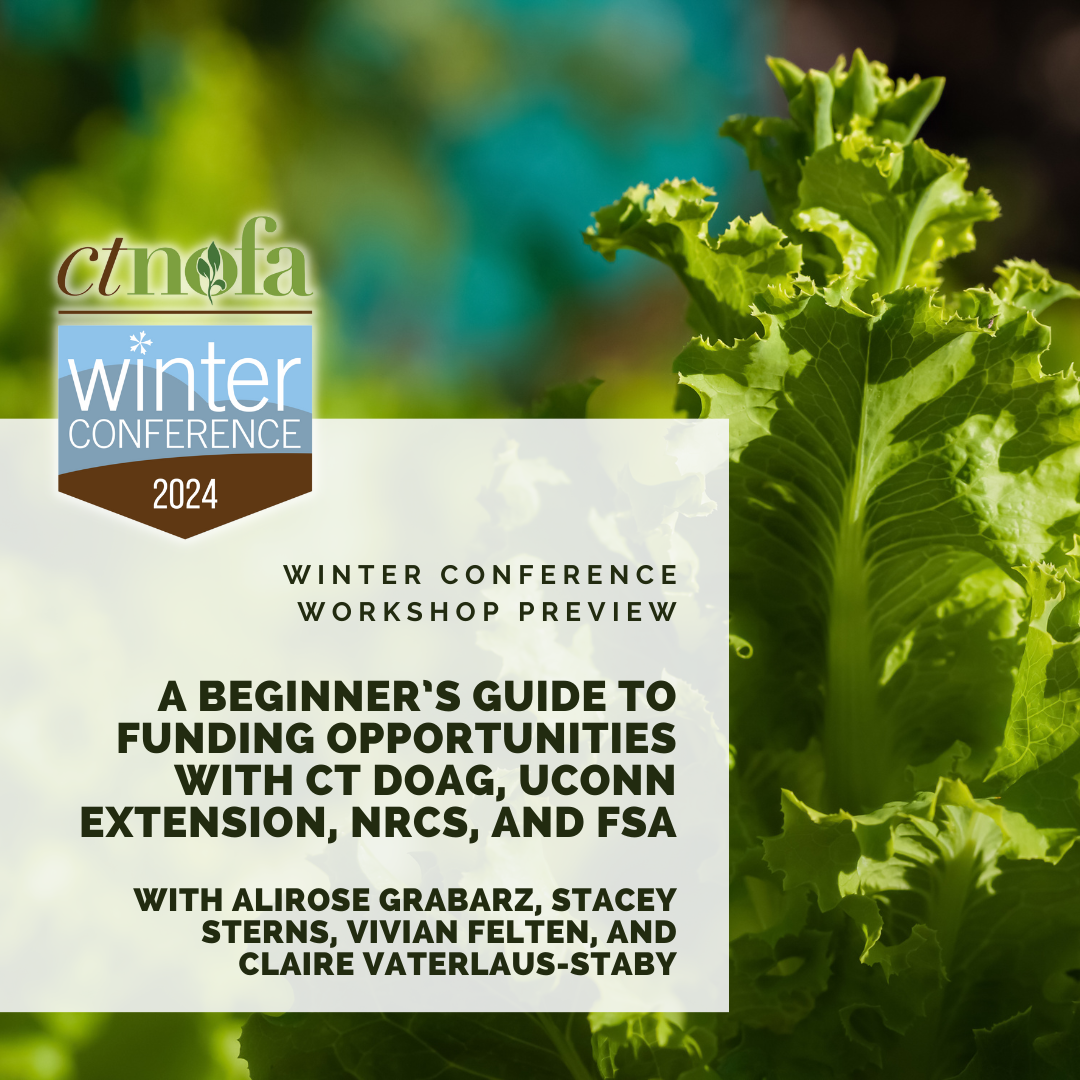
A Beginner’s Guide to Funding Opportunities with CT DoAG, UConn Extension, NRCS, and FSA
9:00 AM
ALIROSE GRABARZ, STACEY STEARNS, VIVIAN FELTEN, and CLAIRE VATERLAUS-STABY
Tracks: Beginning Farmer
This workshop will cover funding opportunities for new/beginning, and established farmers in CT. Along with available programs, speakers will provide information on eligibility requirements, business planning, registering a farm business, services provided by local NRCS service centers, and grant writing tips and tricks.
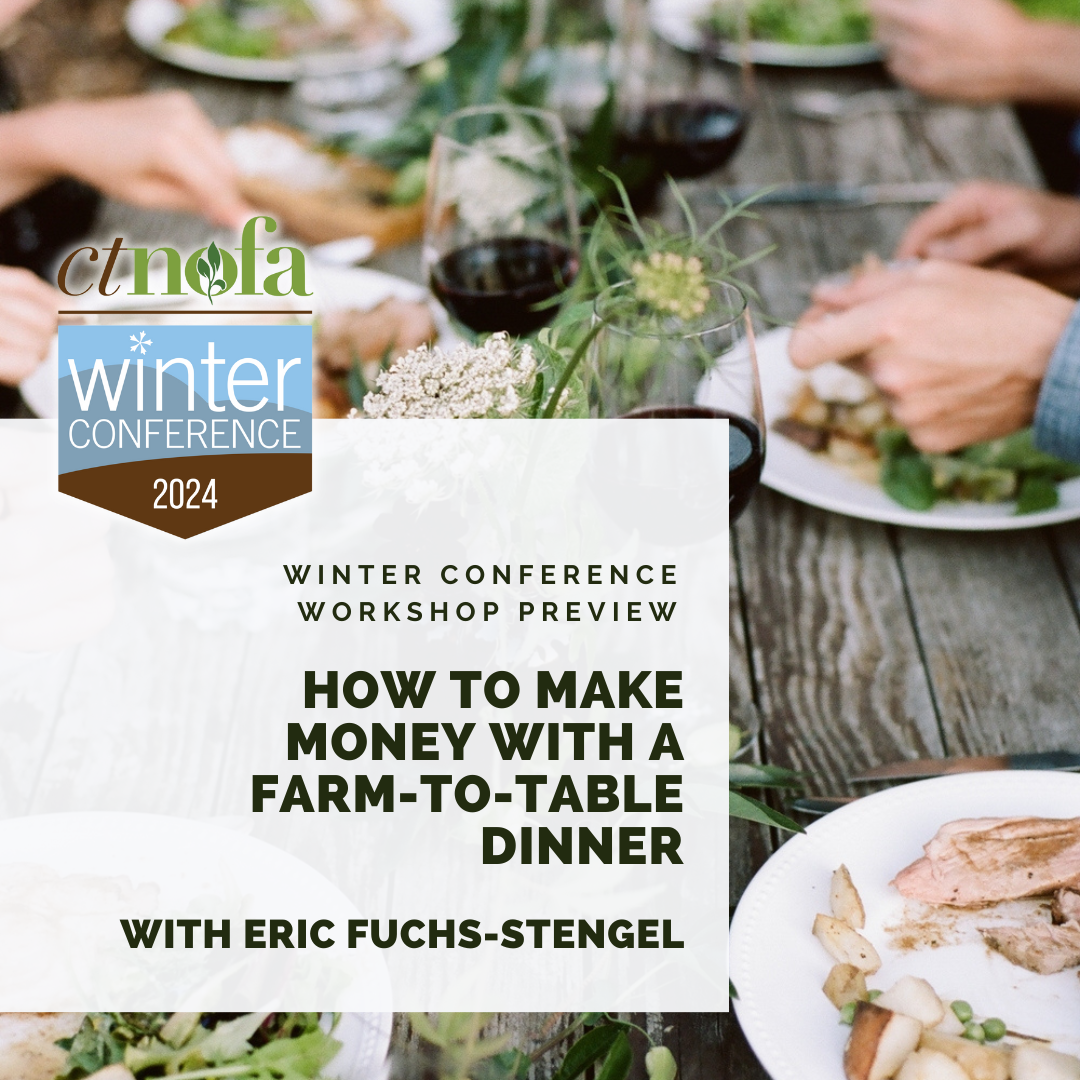
How to Make Money with a Farm to Table Dinner
9:00 AM
ERIC FUCHS-STENGEL | National Center for Appropriate Technology
Tracks: Beginning Farmer
If you have fresh local food and a beautiful farm this is an ideal opportunity to generate additional income to diversify your revenue streams. Farm to Table dinners are an excellent way to build your customer base, gain brand loyalty, highlight your growing, and earn extra revenue.

Creating Balanced Landscapes with Beneficial Plants / Creando paisajes equilibrados con plantas beneficiosas
9:00 AM
PAULA A. KOVECSES
Tracks: Organic Land Care
This workshop will discuss creating balanced landscapes by adding beneficial plants. All plants have a purpose and a balanced garden is necessary for many environmental issues we face today. Going for more sustainable ways of gardening, as well as using the right plants, will reduce the need for products/chemicals for your garden.
Este taller discutirá la creación de paisajes equilibrados mediante la adición de plantas beneficiosas. Todas las plantas tienen un propósito y un jardín equilibrado es necesario para muchos problemas medioambientales a los que nos enfrentamos hoy en día. Optar por formas de jardinería más sostenibles, además de utilizar las plantas adecuadas, reducirá la necesidad de productos/químicos para su jardín.
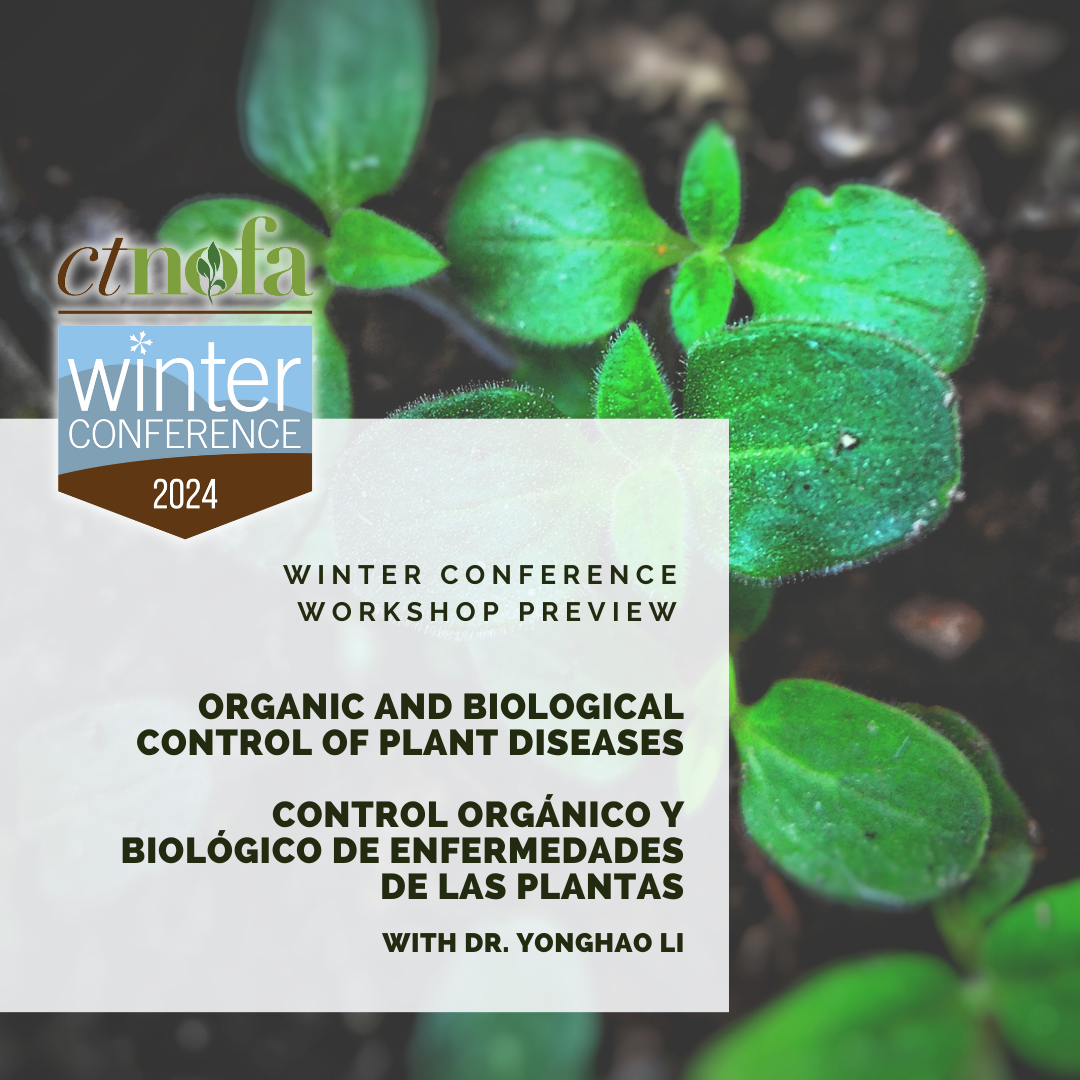
Organic and Biological Control of Plant Diseases / Control Orgánico y Biológico de Enfermedades de las Plantas
12:00 PM
DR. YONGHAO LI | Connecticut Agricultural Experiment Station
Tracks: Transition to Organic Farming
Biological control is an attractive alternative strategy for disease management especially in organic farming. In this talk, Dr. Yonghao Li will discuss common biorational and biological products and their mode of action, application methods, and target diseases.
El control biológico es una estrategia alternativa atractiva para el manejo de enfermedades, especialmente en la agricultura orgánica. En esta charla, el Dr. Yonghao Li discutirá productos biológicos y biorracionales comunes y su modo de acción, métodos de aplicación y enfermedades objetivo.
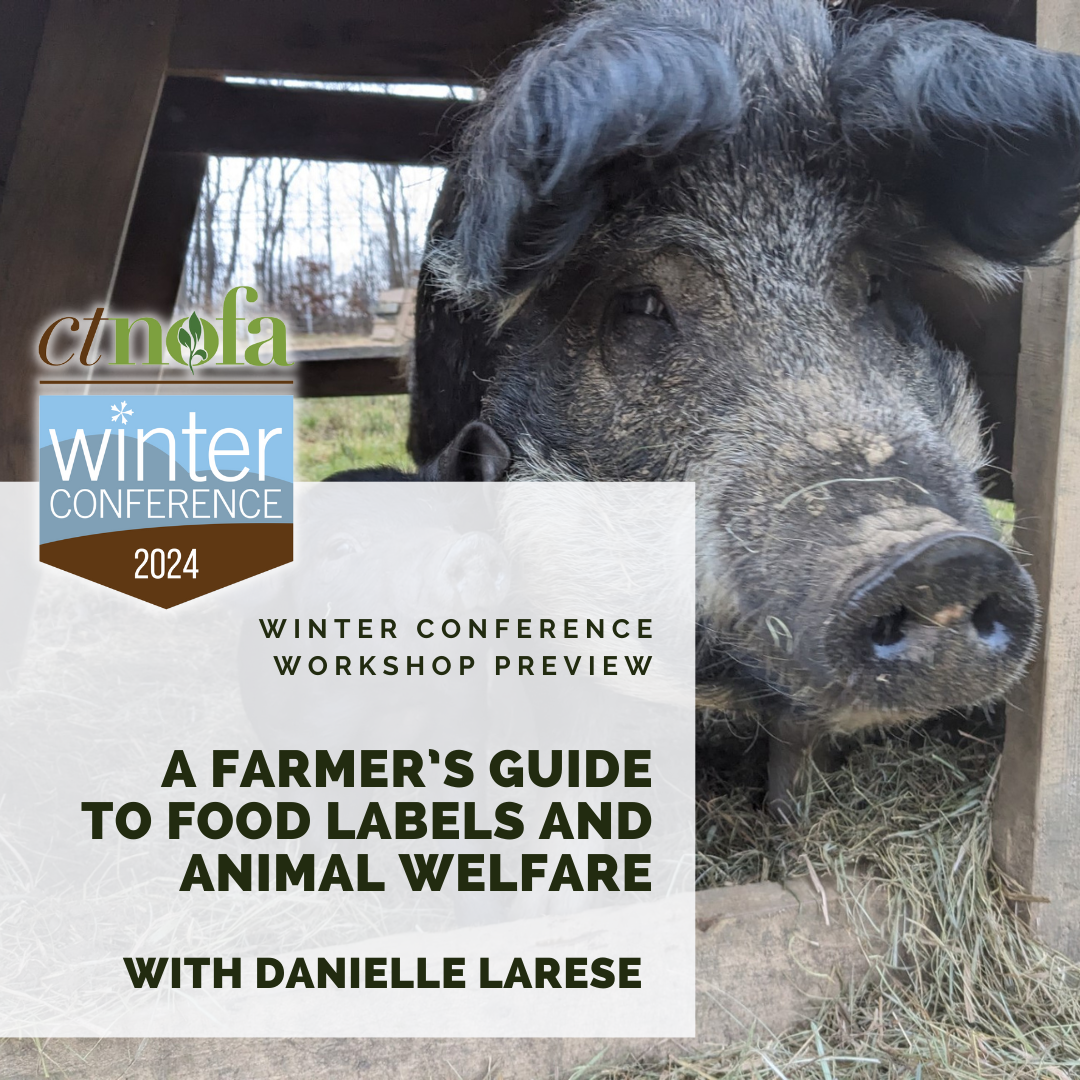
A Farmer’s Guide to Food Labels and Animal Welfare
12:00 PM
DANIELLE LARESE | BOTL Farm
Tracks: Beginning Farmer
Interested in getting started with livestock? Set yourself apart! We’ll discuss the maze of food labels and label claims including organic, Animal Welfare Approved, Certified Humane, Certified Natural, and others. Then we’ll cover practical considerations about implementing the required standards and how to distinguish which are greenwashing, meaningful, or somewhere in between.
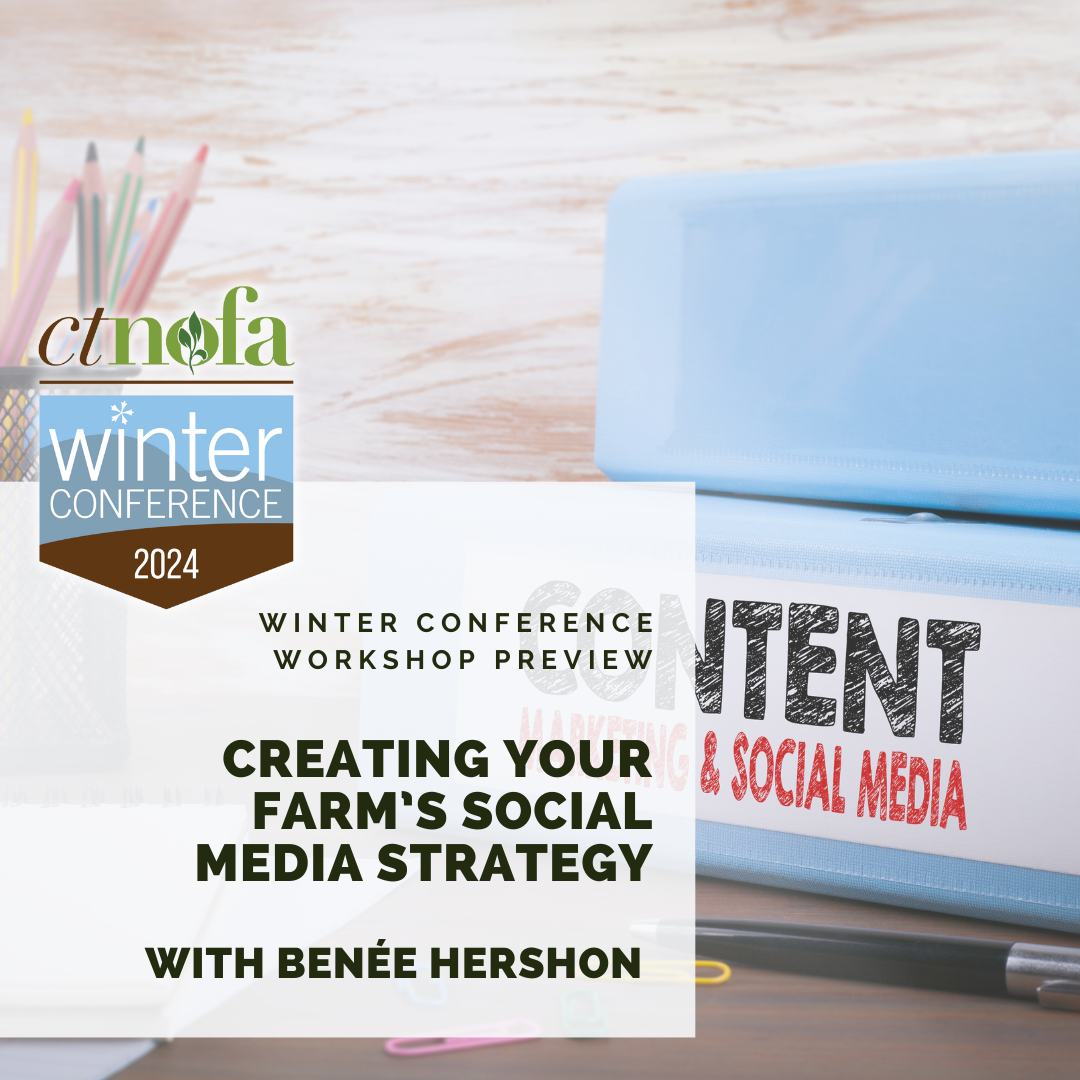
Creating Your Farm’s Social Media Strategy
3:00 PM
BENÉE HERSON
Tracks: Beginning Farmer
The world of social media can be overwhelming, but it doesn’t have to be! Learn how to utilize social media platforms to tell your farm’s story and play to your farm’s strengths. Social media is an incredible tool for marketing, engaging your customers, and expanding your farm’s reach. It is crucial to create a thoughtful and realistic social media strategy to best meet your farm’s goals. This workshop will provide tips and tricks to getting started, crafting your social media plan, and maximizing engagement across various forms of social media and digital communications.
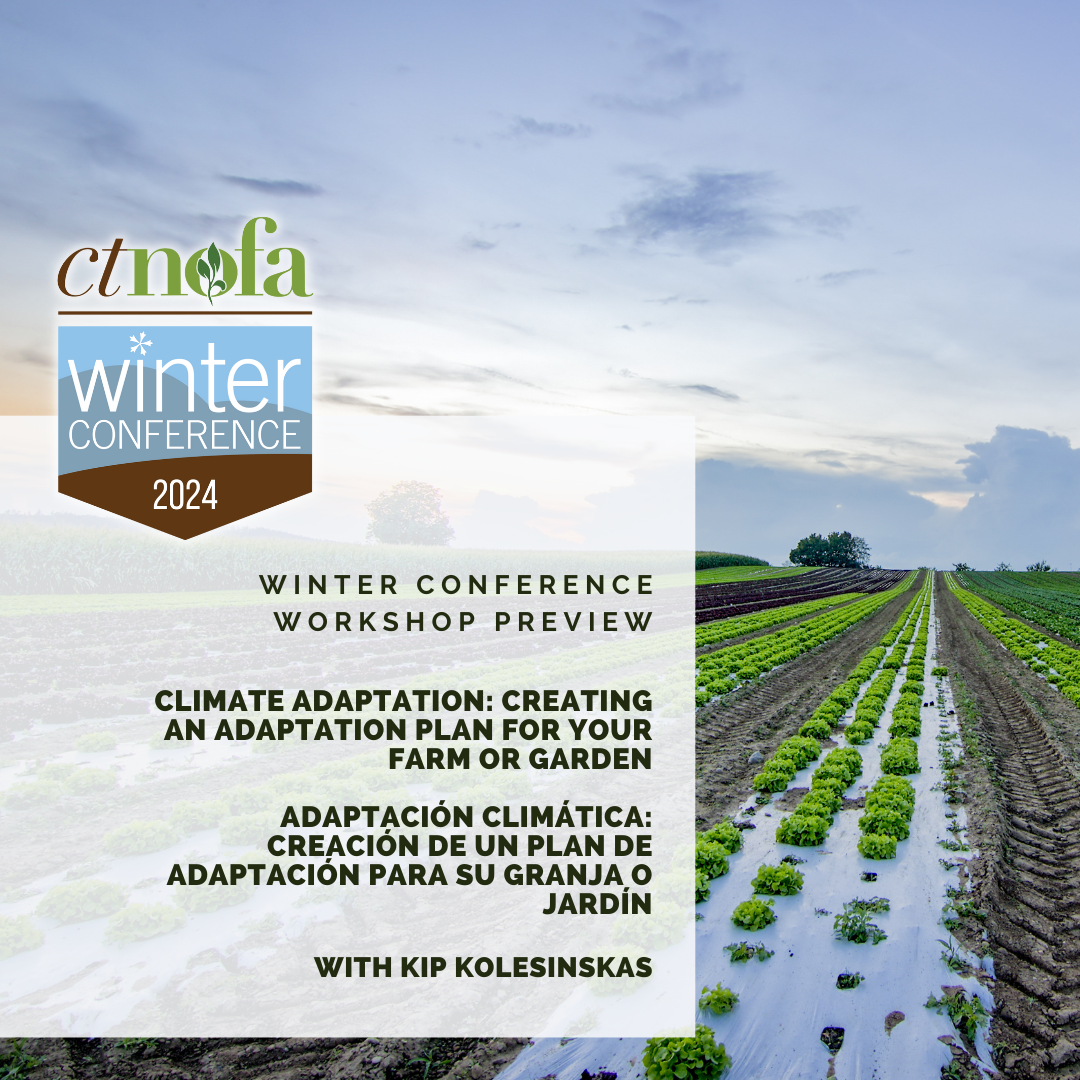
Climate Adaptation: Creating an Adaptation Plan For Your Farm or Garden / Adaptación climática: creación de un plan de adaptación para su granja o jardín
3:00 PM
KIP KOLESINSKAS
Tracks: Transition to Organic Farming, Beginning Farmer, Homesteader/Home Gardener
In this workshop, participants will gain a better understanding of the expected impact of climate change in Connecticut on all forms of agriculture, including home gardens and homesteads. They will be provided information about successful tools, strategies, and conservation practices to reduce the impact, as well as any opportunities, such as longer growing seasons. Participants will be provided a template to develop their own adaptation plan.
En este taller, los participantes obtendrán una mejor comprensión del impacto esperado del cambio climático en Connecticut en todas las formas de agricultura, incluidos los huertos familiares y las granjas. Se les proporcionará información sobre herramientas, estrategias y prácticas de conservación exitosas para reducir el impacto, así como cualquier oportunidad, como una temporada de crecimiento más larga. Los participantes recibirán una plantilla para desarrollar su propio plan de adaptación.
March 23 (live and in-person at Eastern Connecticut state University)
All-Day clinics & events
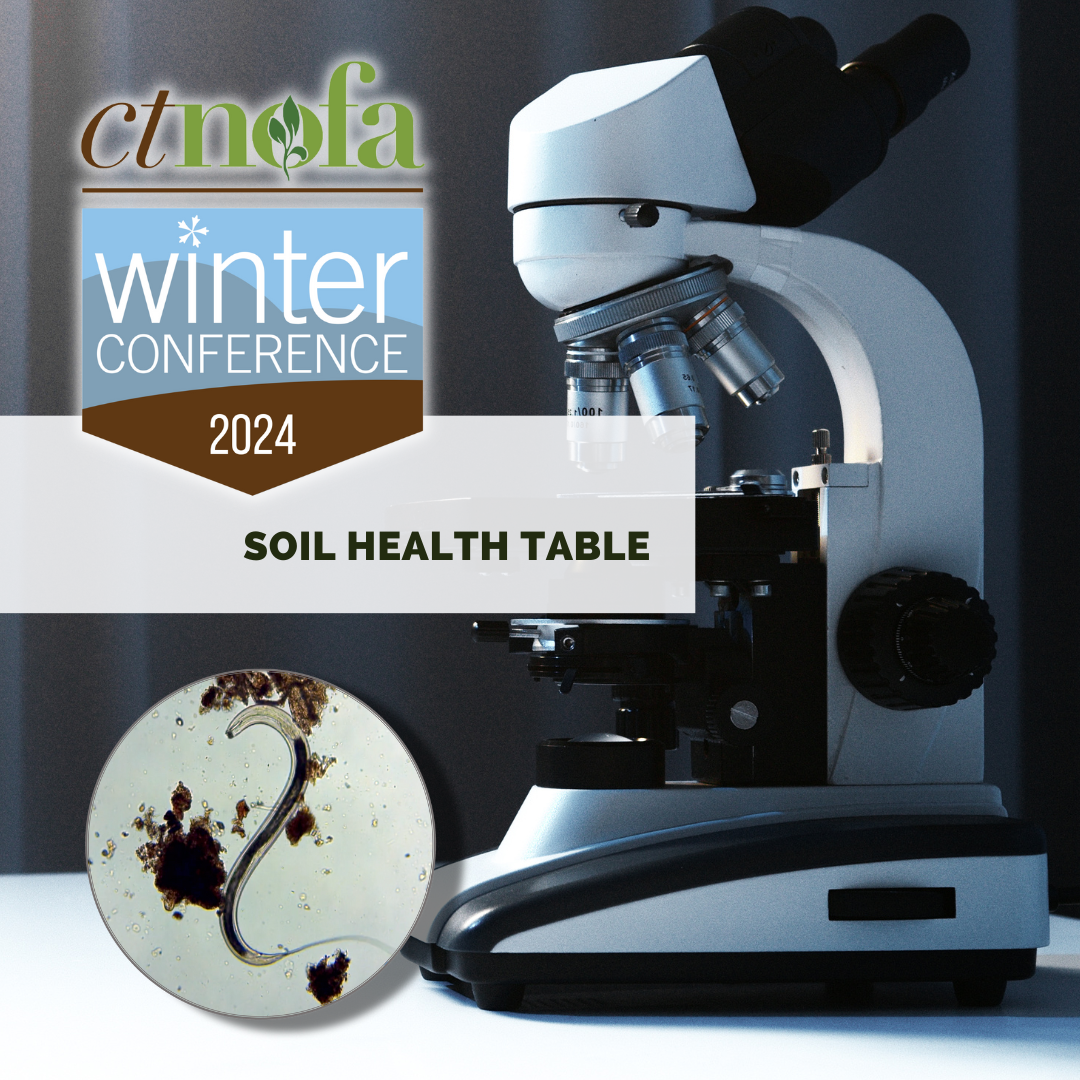
Soil Health Table
All-Day
CT NOFA Staff
Tracks: N/A
Throughout the in-person Saturday session of CT NOFA’s Winter Conference we will have our Soil Health table set up, with videos showing soil samples from local farmers. We will also have information available for CT NOFA’s 2024 Microscopy Training course. Come talk with us about this exciting new program, which includes a microscope and all the materials you need to see the life in your own soil and compost.
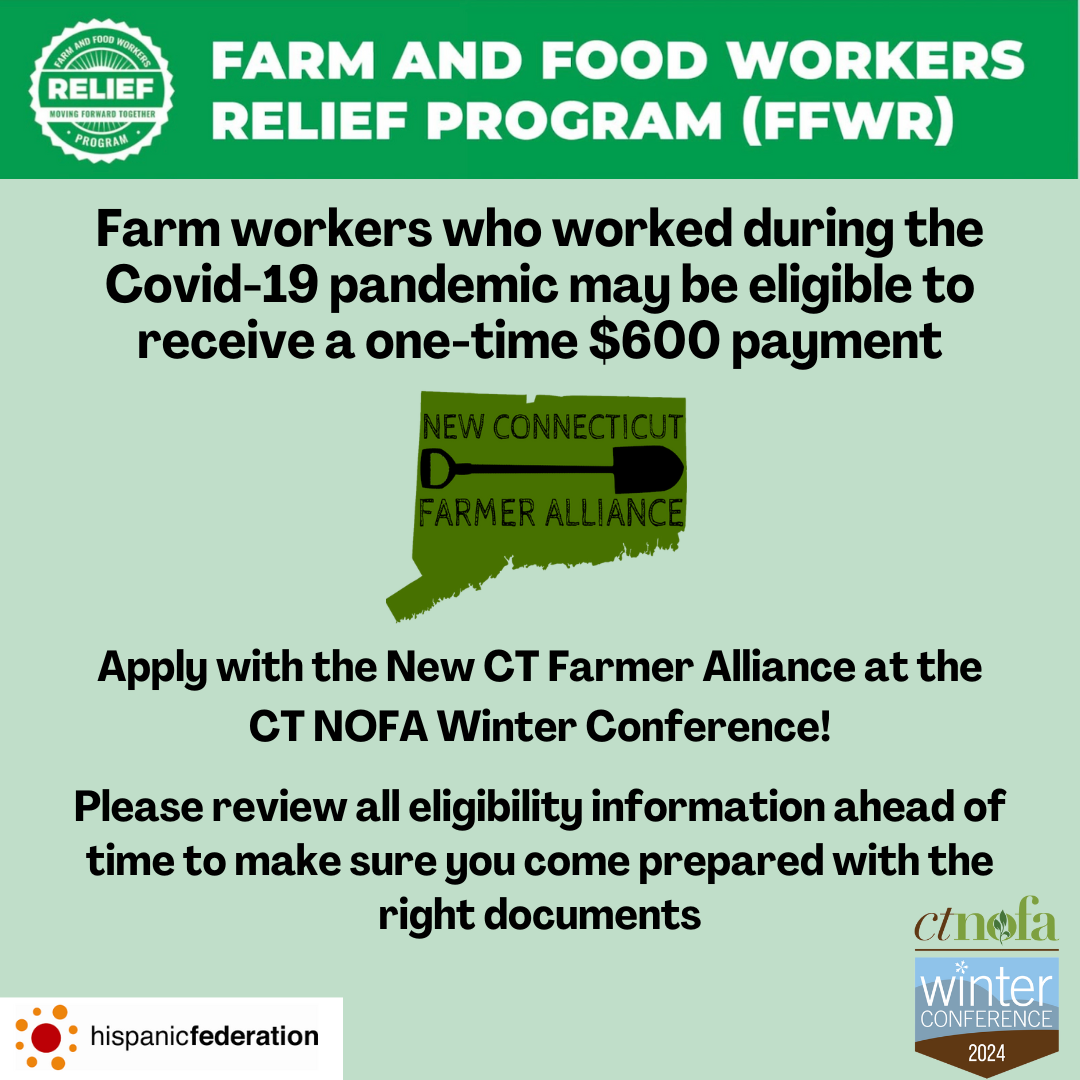
Farm and Food Workers Relief Program Table
All-Day
NCTFA and the Hispanic Federation
Tracks: N/A
ATTENTION FARM WORKERS!
You might be eligible to receive a $600 payment at the CT NOFA winter conference!
The New CT Farmer Alliance (NCTFA) is working with the Hispanic Federation to distribute one-time $600 payments to farm workers who worked on food-producing farms in Connecticut during the covid-19 pandemic. NCTFA will be tabling at this year’s CT NOFA winter conference to help folks apply for this money. Learn more here.
session 1 (9:45am-11:00am)
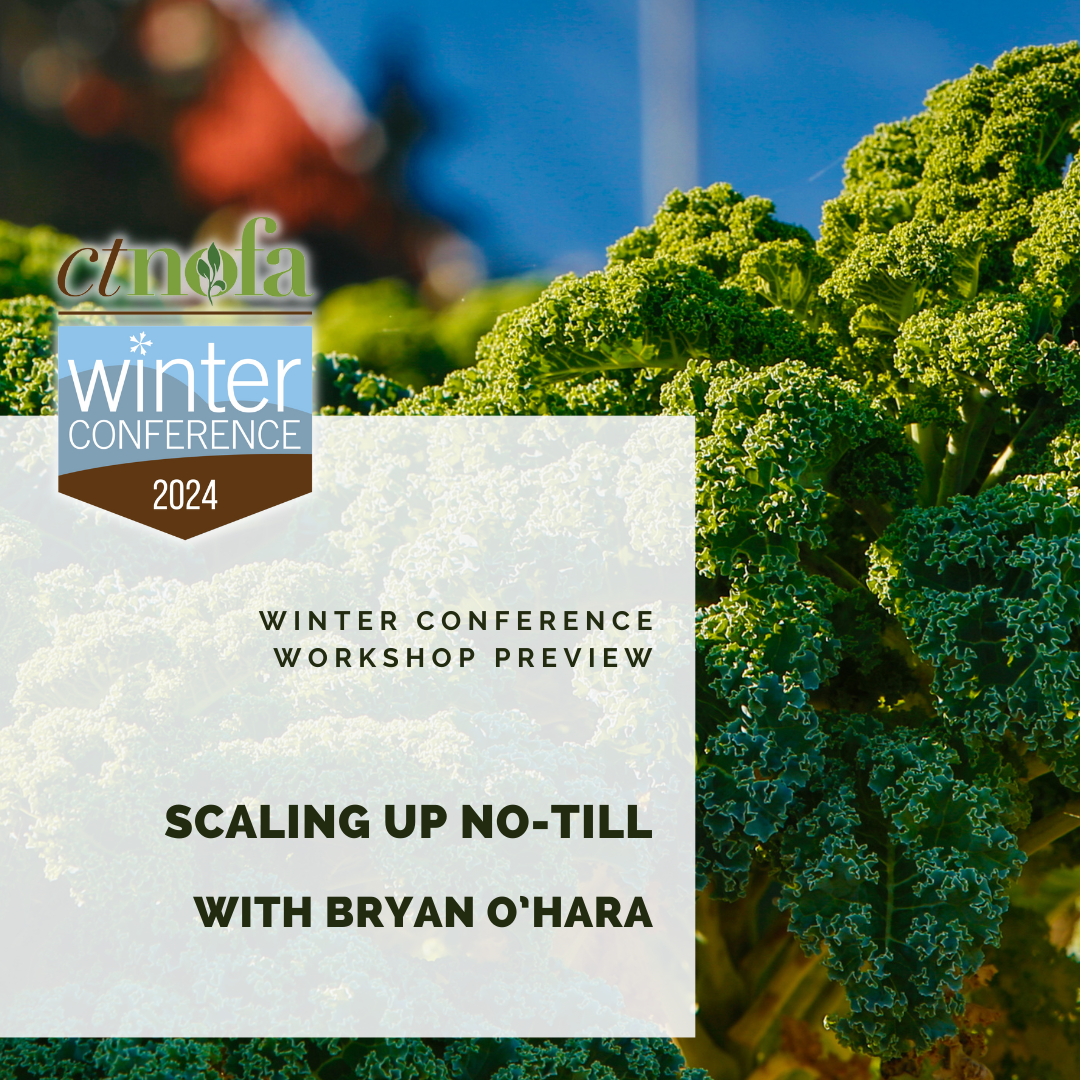
Scaling Up No-Till
9:45 AM
Bryan O'Hara
Tracks: Transition to Organic Farming, Beginning Farmer, Homesteader/Home Gardener
In this workshop, ideas for increasing the speed and efficiency of no-till vegetable production will be presented. The adaptation of tools and equipment to no-till systems can provide extensive improvement as in labor efficiencies of doing the right thing at the right time. Come gather ideas from our years of trial and error and development of an efficient, mechanized no-till vegetable system.
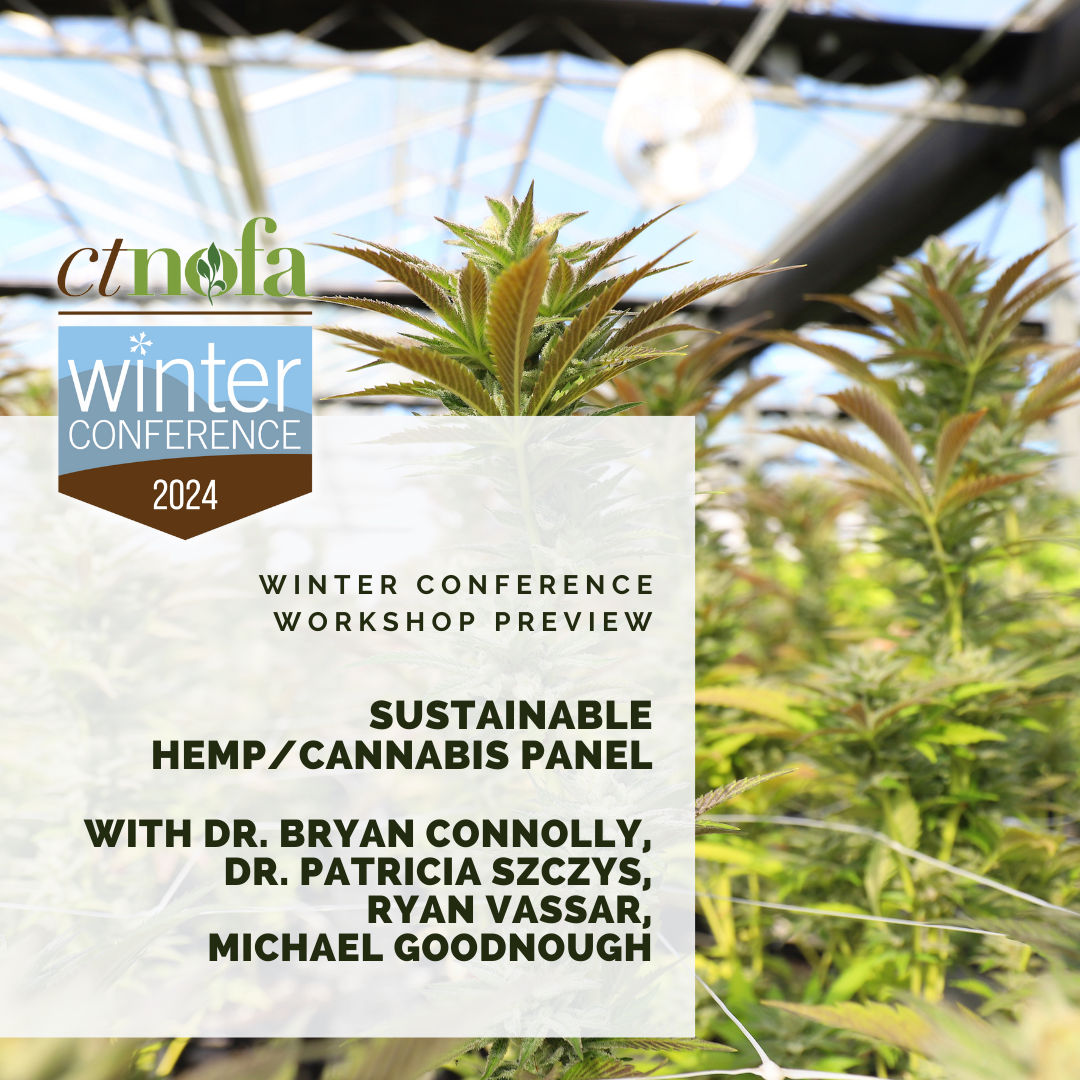
Sustainable Hemp/Cannabis Panel
9:45 AM
Dr. Bryan Connolly, Dr. Patty Szczys, Ryan Vassar, and Michael Goodnough
Tracks: Policy and Advocacy
This panel will made up of experts and educators who work towards the goal of sustainability in the Cannabis industry. Energy efficient and zero waste Cannabis and hemp production will be discussed. Additionally, we will have a conversation about the requirements of Eastern Connecticut State University’s New England Sustainable Cannabis Certification (NESCC).
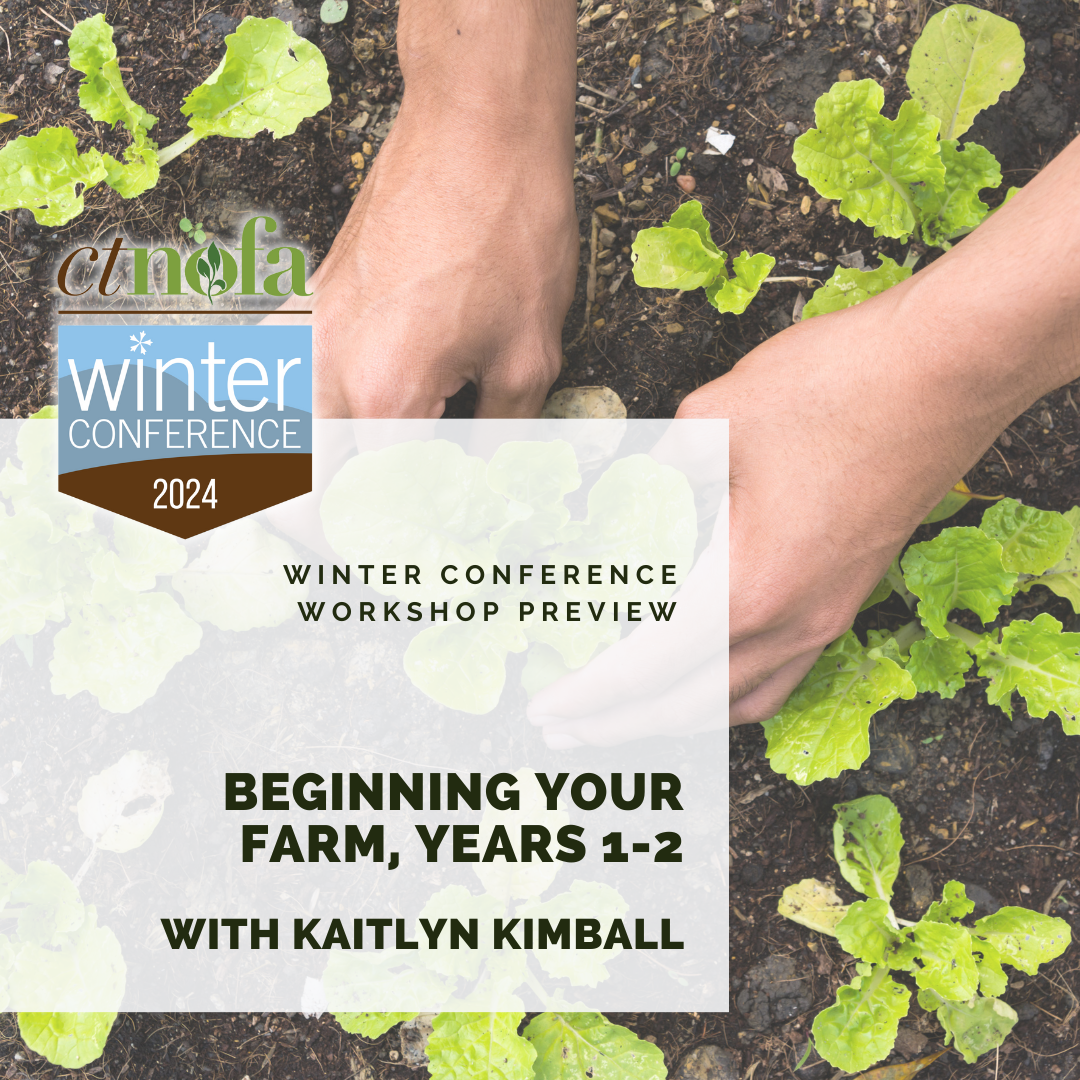
Beginning Your Farm, Years 1-2
9:45 AM
KAITLYN KIMBALL | Sunset Farm
Tracks: Beginning Farmer
This workshop will explore planning and resources for beginning a vegetable and flower farm in Connecticut. Participants will learn more about their motivations and “why” behind starting a farm, and how to choose the best farming model based on those motivations, i.e. financial gain, personal enjoyment, community engagement, etc. The workshop will explore sales outlets (farm stand, CSA, farm to school, wholesale, retail, farmers markets) and how to select which sales outlet is best for your farm, marketing (website, social media, newsletter), basic production methods and models (certified organic, certified naturally grown, no till, IPM, climate smart ag, high tunnel etc., as well as explore resources available to new farmers and their programs (NRCS, NCTFA, Solid Ground UConn Extension, The Carrot Project, CT NOFA, etc.).
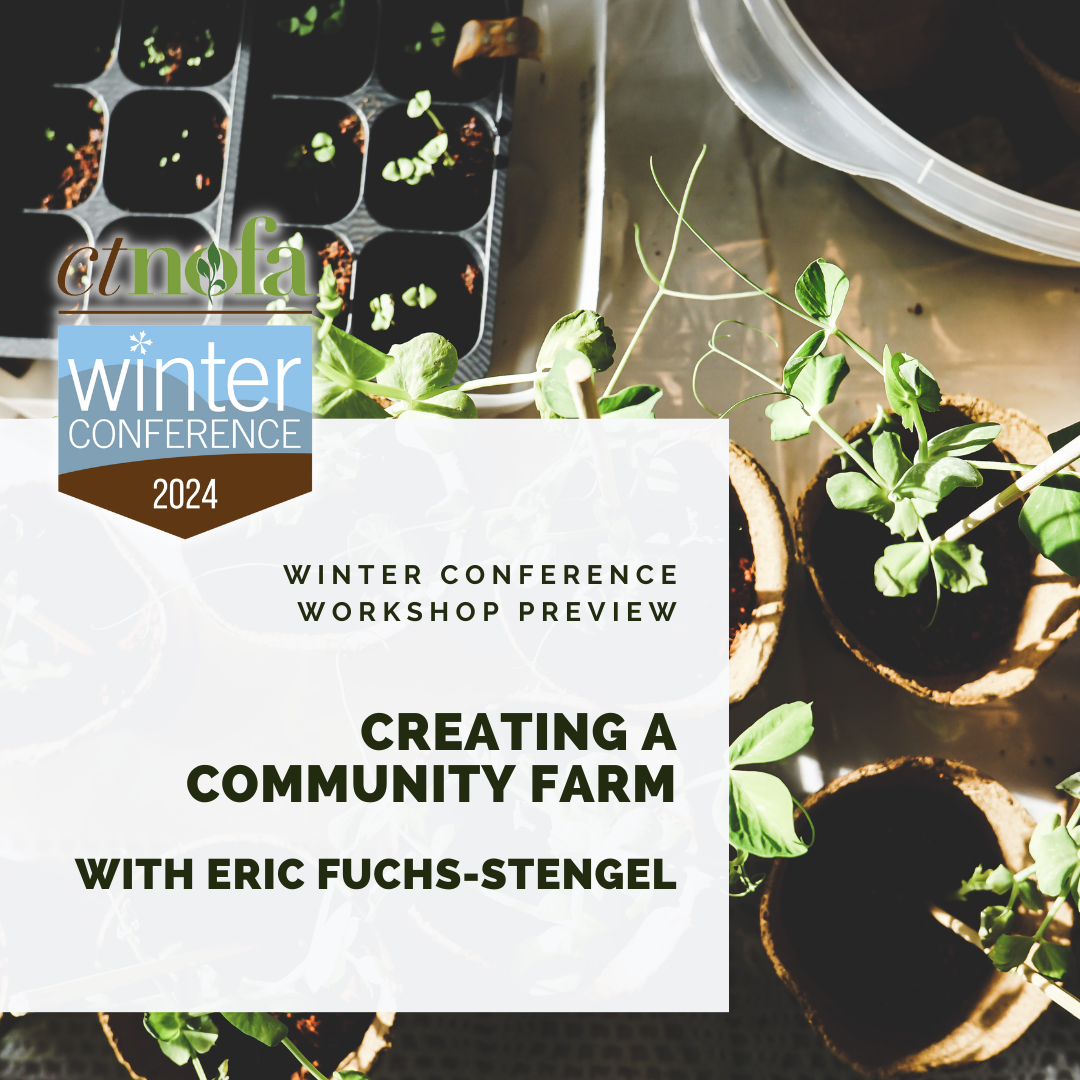
Creating a Community Farm
9:45 AM
ERIC FUCHS-STENGEL | National Center for Appropriate Technology
Tracks: Food Justice
Community Farms are growing in popularity due to their ability to reconnect neighborhoods with the earth, local food, and their community. In this session, we will discuss strategies, resources, and tools you can use to create a community farm that fits the needs of your community. We will look into a successful existing operation and discuss how you can navigate the often complex startup of a community farm with minimal initial input of resources.
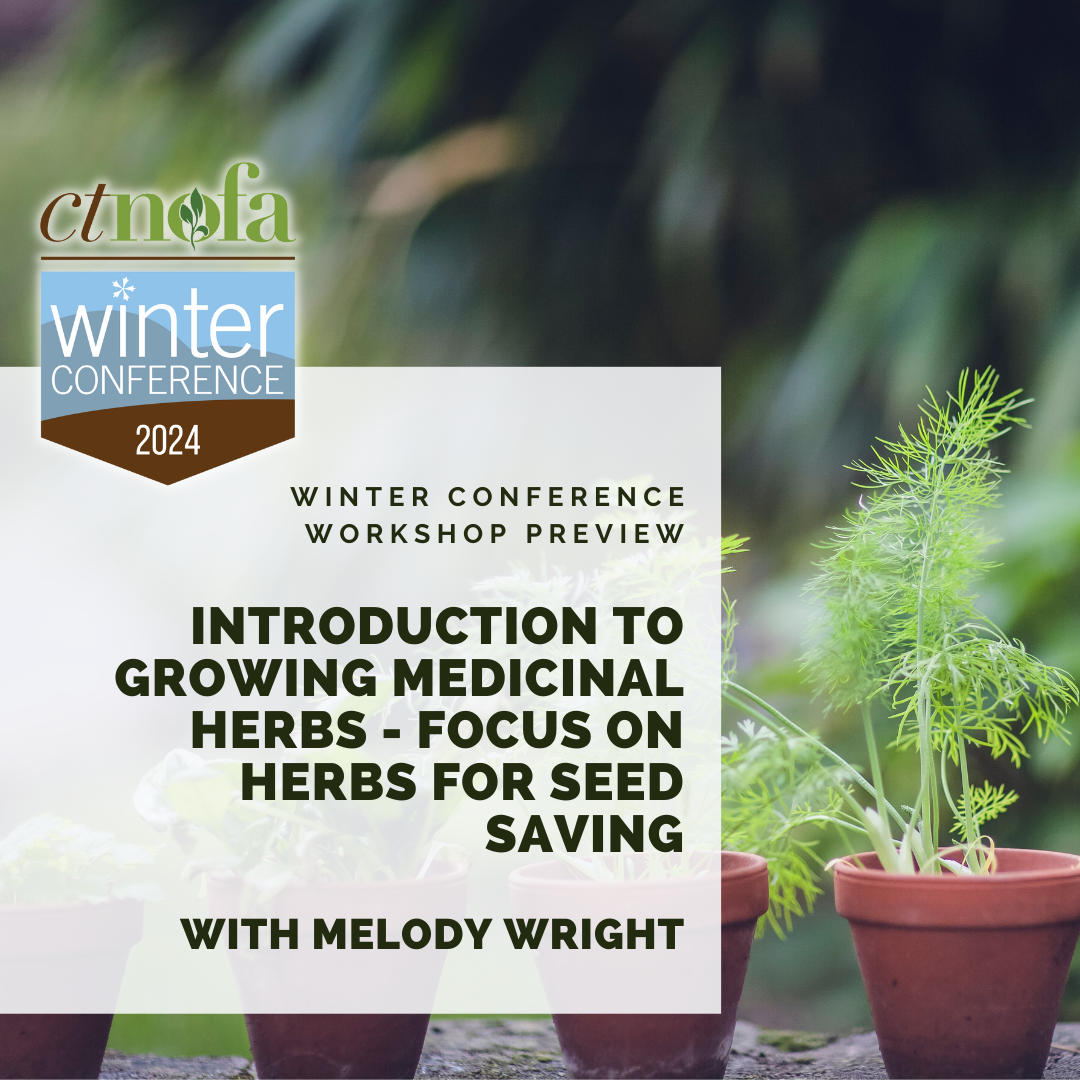
Introduction to Growing Medicinal Herbs: Focus on Herbs for Seed Saving
9:45 AM
MELODY WRIGHT | Pleasant Valley Botanicals
Tracks: Beginning Farmer, Homesteader/Home Gardener, Food Justice/Food Security
This workshop will cover seed starting, growing, and harvesting of some favorite medicinal and culinary herbs. It will cover agro-ecology, mycorrhizal inoculants, pollinator favorites, cold stratification, tools, and direct sow versus transplanting. We’ll also focus on farmer favorites that offer easier opportunities for New England seed saving. This workshop is designed for gardeners or farmers who have some basic growing experience but want to expand their skills and incorporate medicinal and culinary herbs. This workshop is also for folks interested in a short introduction into seed saving for herbs that grow well in our region.
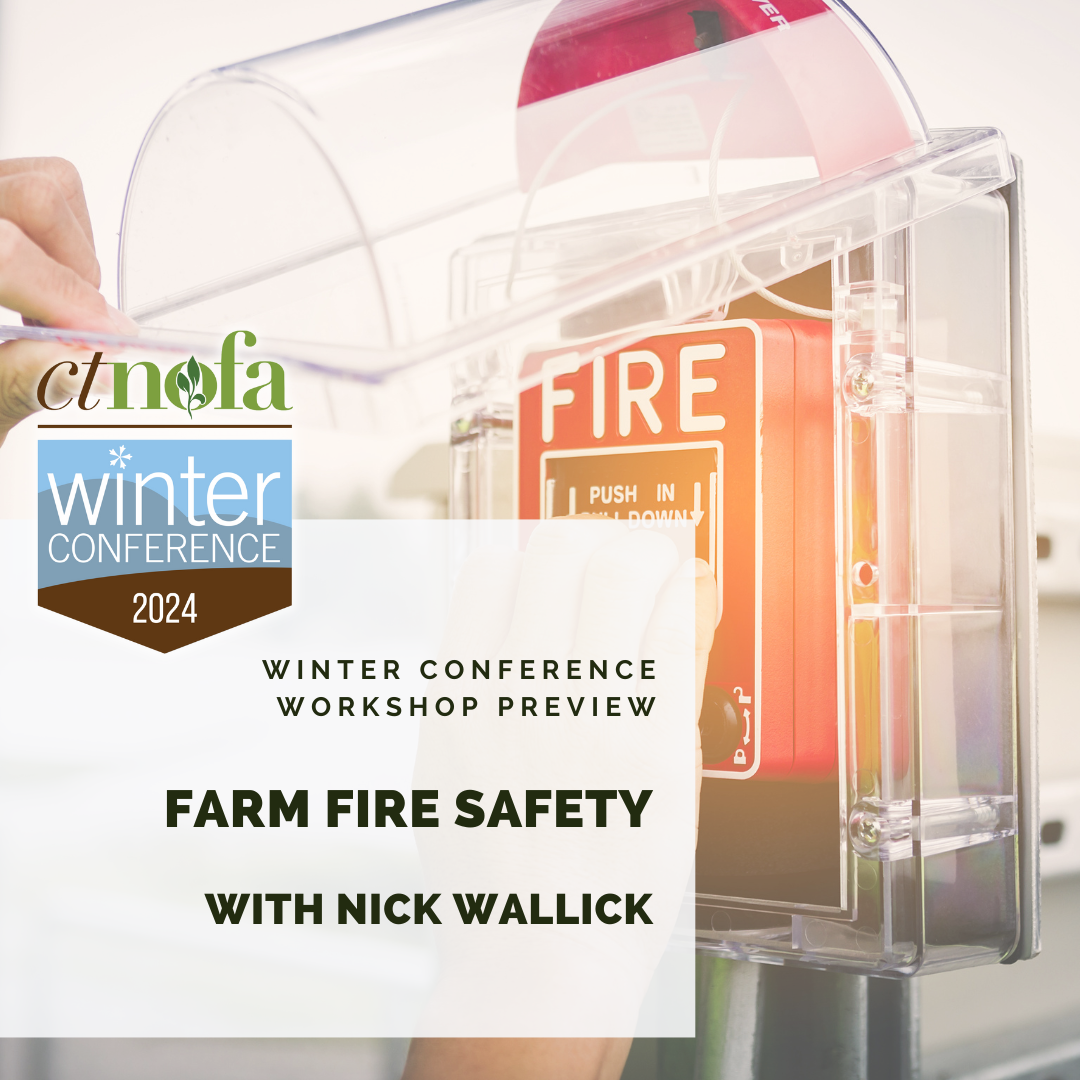
Farm Fire Safety
9:45 AM
NICK WALLICK
Tracks: Beginning Farmer
This session will cover topics related to maintaining a safer farm. Hazards will be discussed and how to mitigate them, as well as how to interact with your local fire department to educate them and improve farm access in case of an event. This presentation has been delivered across Connecticut to equine clubs.
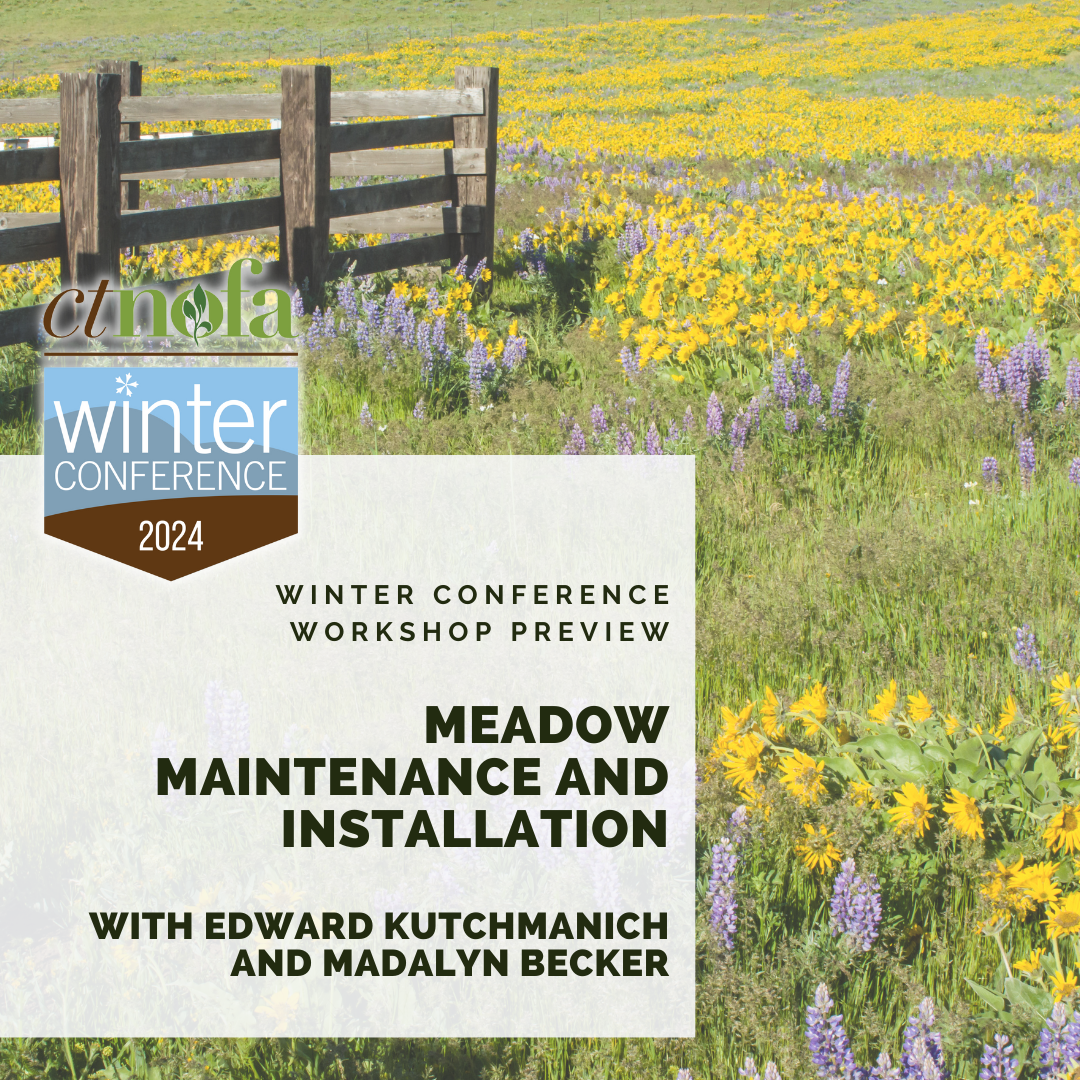
Meadow Maintenance and Installation
9:45 AM
EDWARD KUTCHMANICH and MADALYN BECKER | Botanica Land Care
Tracks: Organic Land Care
This workshop will provide insight into challenges faced with installing and maintaining a meadow on new construction sites. We will discuss tricks to get quicker establishment, the key to implementing your meadow strategies, ways to combat or prevent compaction and other problems faced with establishing meadows on new construction sites. Lastly, we will engage in frequently asked questions by clients and ways to get them intrigued on their new “long term investment”. Botanica has learned the importance of communicating the steps involved in the meadow installation/maintenance process and will share them with you!
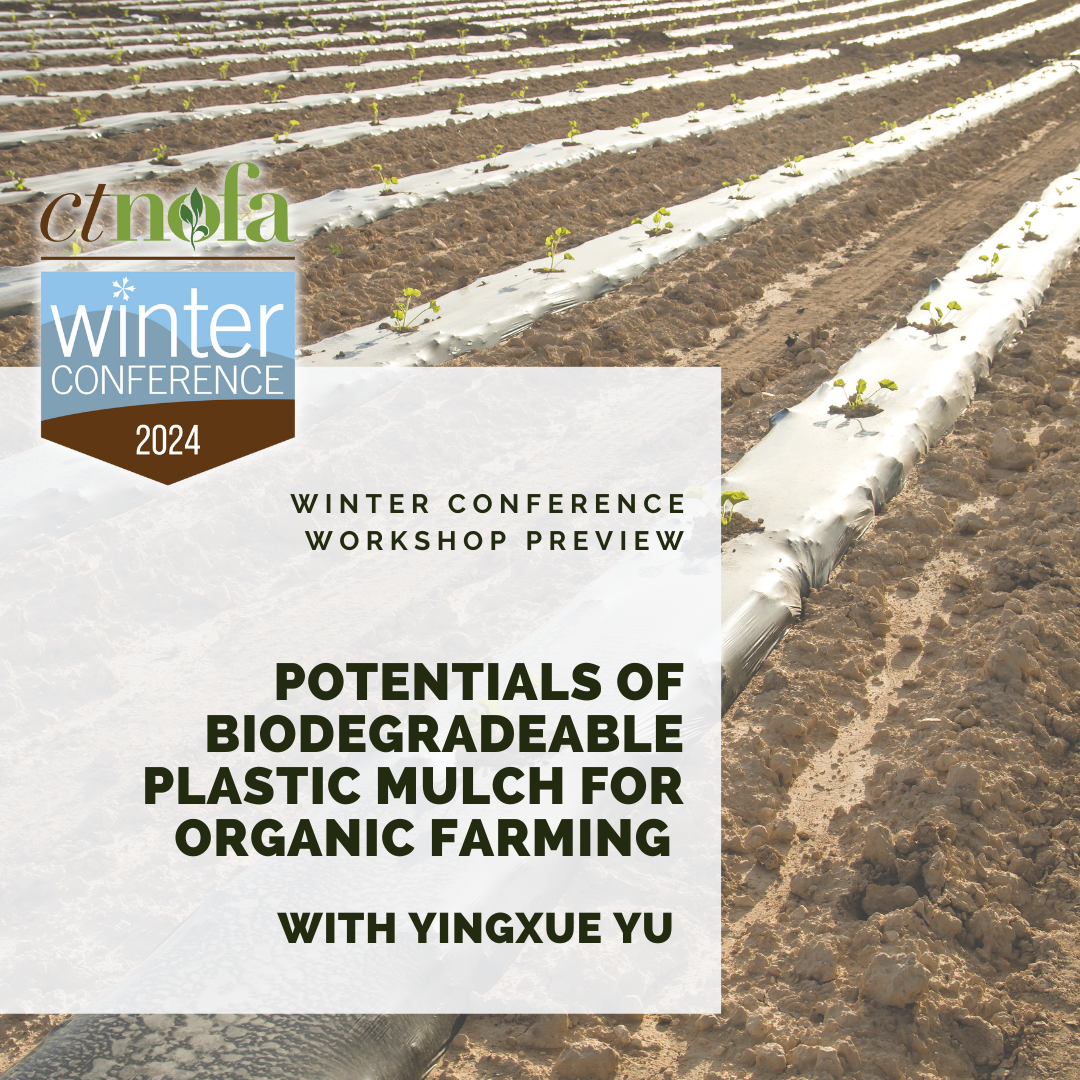
Potentials of Biodegradable Plastic Mulch for Organic Farming
9:45 AM
YINGXUE (CHARLIE) YU | The Connecticut Agricultural Experiment Station
Tracks: Organic Land Care, Policy and Advocacy
Plastic mulching is a critical agricultural practice for food production which provides multiple benefits, including water conservation, weed control, and increased crop yield and quality. However, the application of conventional polyethylene mulch films has led to plastic pollution in the terrestrial environment because mulch residues in fields are difficult to remove and recycle. To address this issue, soil-biodegradable plastic mulches (BDMs) have been introduced to replace conventional polyethylene mulches, as BDMs are designed to provide desired agronomic outcomes as well as in-situ disposal and degradation. Thus, increasing interests have been expressed towards BDMs in both research and application areas. In this workshop, Dr. Yingxue (Charlie) Yu will an update about current knowledge around BDMs. Specifically, she will give an introduction about BDMs, current policies on usage of BDMs in organic farming, agronomical performance of BDMs, in-field degradation of BDMs, environmental impacts of BDMs, economics of BDMs, and challenges and potentials of BDMs in organic farming.
session 2 (11:15am-12:30pm)
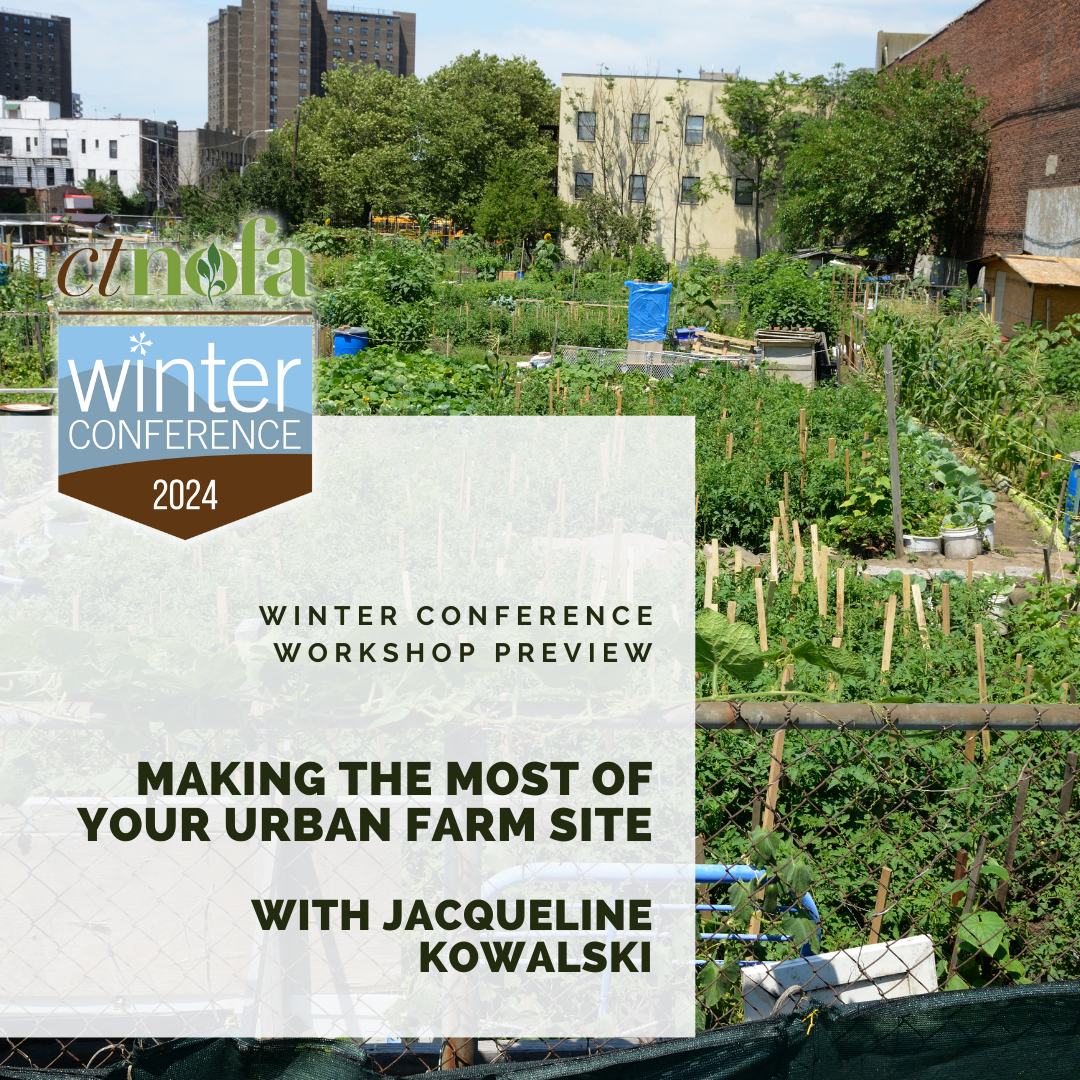
Making the Most of Your Urban Farm Site
11:15 AM
JACQUELINE KOWALSKI | UConn
Tracks: Beginning Farmer, Food Justice/Food Security, Homesteader/Home Gardner
Farming in the city brings many challenges. The built environment, tree canopy, soil quality, wildlife management, and many other factors are important to consider. This presentation will provide tips for site selection for your farm/garden, site modification, and production options for small urban sites. Attendees will participate in hands-on activities and should bring pictures or drawings of their sites to discuss.
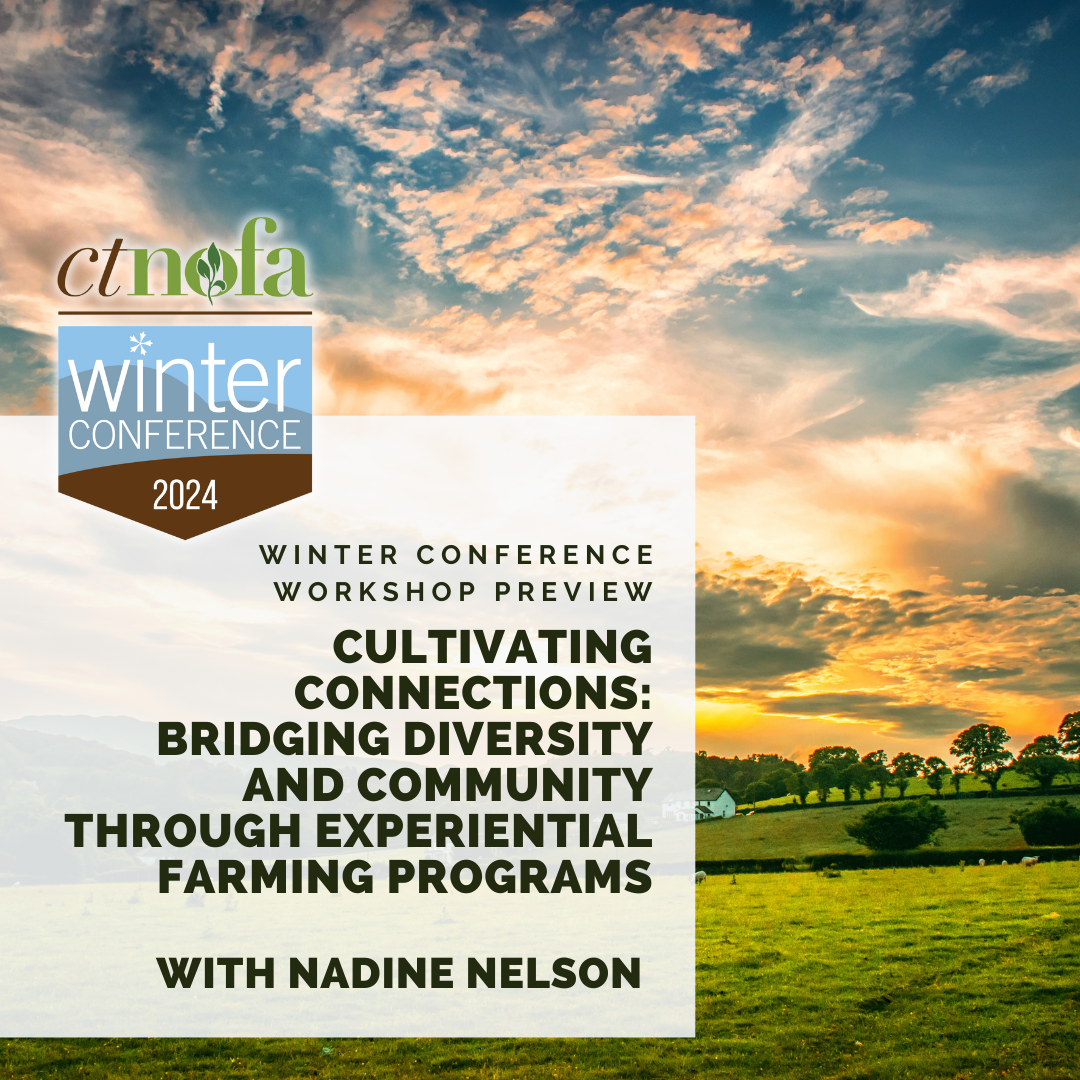
Cultivating Connections: Bridging Diversity and Community Through Experiential Farming Programs
11:15 AM
NADINE NELSON | Global Local Gourmet
Tracks: Food Justice/Food Security, Beginning Farmer, Policy and Advocacy, Homesteader/Home Gardener
“Cultivating Connections” is an innovative workshop designed to redefine the perception of farms from mere food production centers to vibrant, diverse community hubs. This workshop offers a platform for showcasing the cultural relevance of farms in fostering jubilation, celebration, activism, and advocacy, a perspective often celebrated in various cultures globally but overlooked in some areas. Through interactive educational stations, participants will engage in activities that blend agriculture, sustainability, and community welfare. These stations will not only impart knowledge about sustainable farming practices and environmental stewardship but also highlight the cultural richness and diversity inherent in agricultural communities.
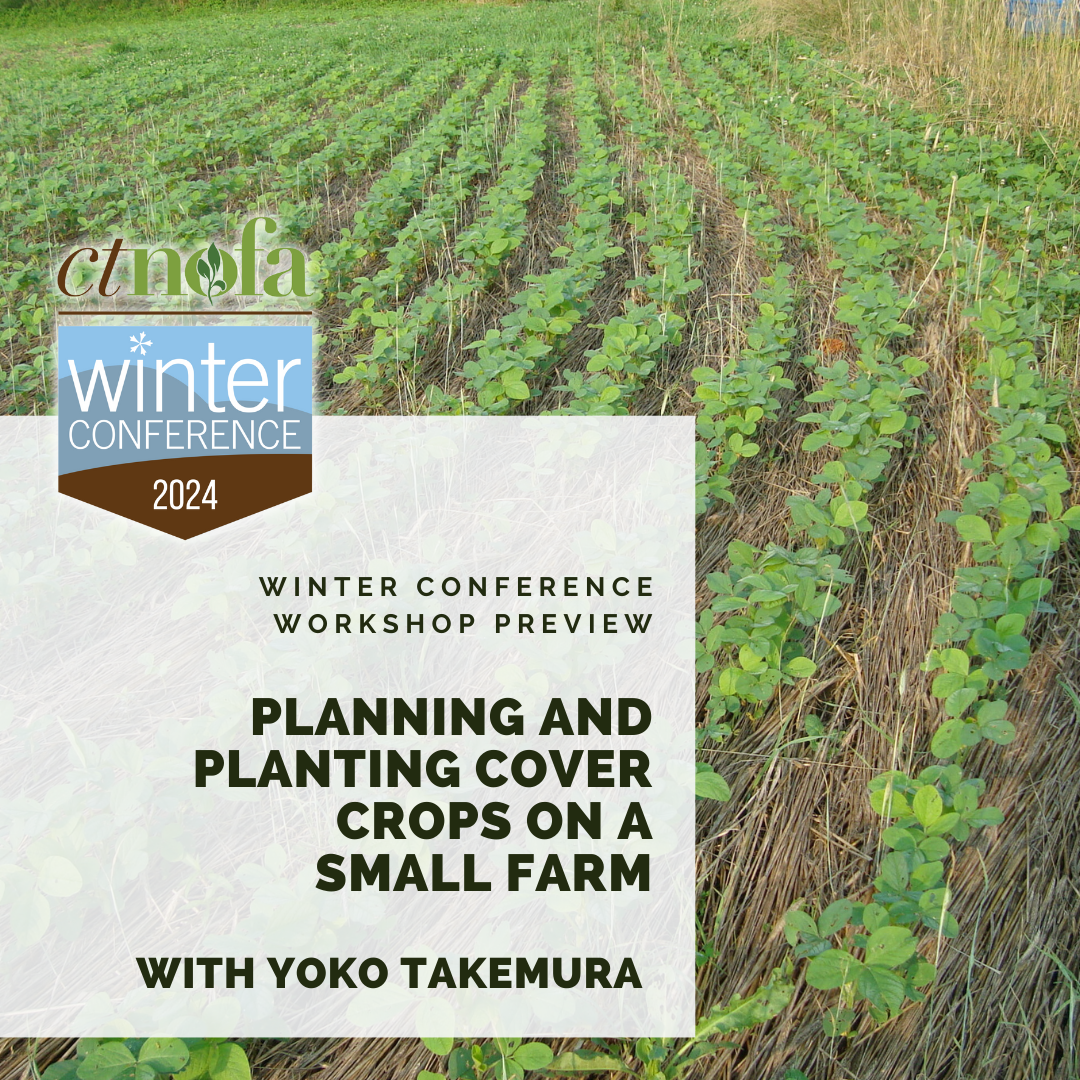
Planning and Planting Cover Crops on a Small Farm
11:15 AM
YOKO TAKEMURA | Assawaga Farm
Tracks: Transition to Organic Farming, Beginning Farmer, Homesteader/Home Gardener
This workshop will explain how to integrate cover crops into your vegetable crop plan and successfully execute them from planning to sowing to terminating in a no-till, hand-powered context.
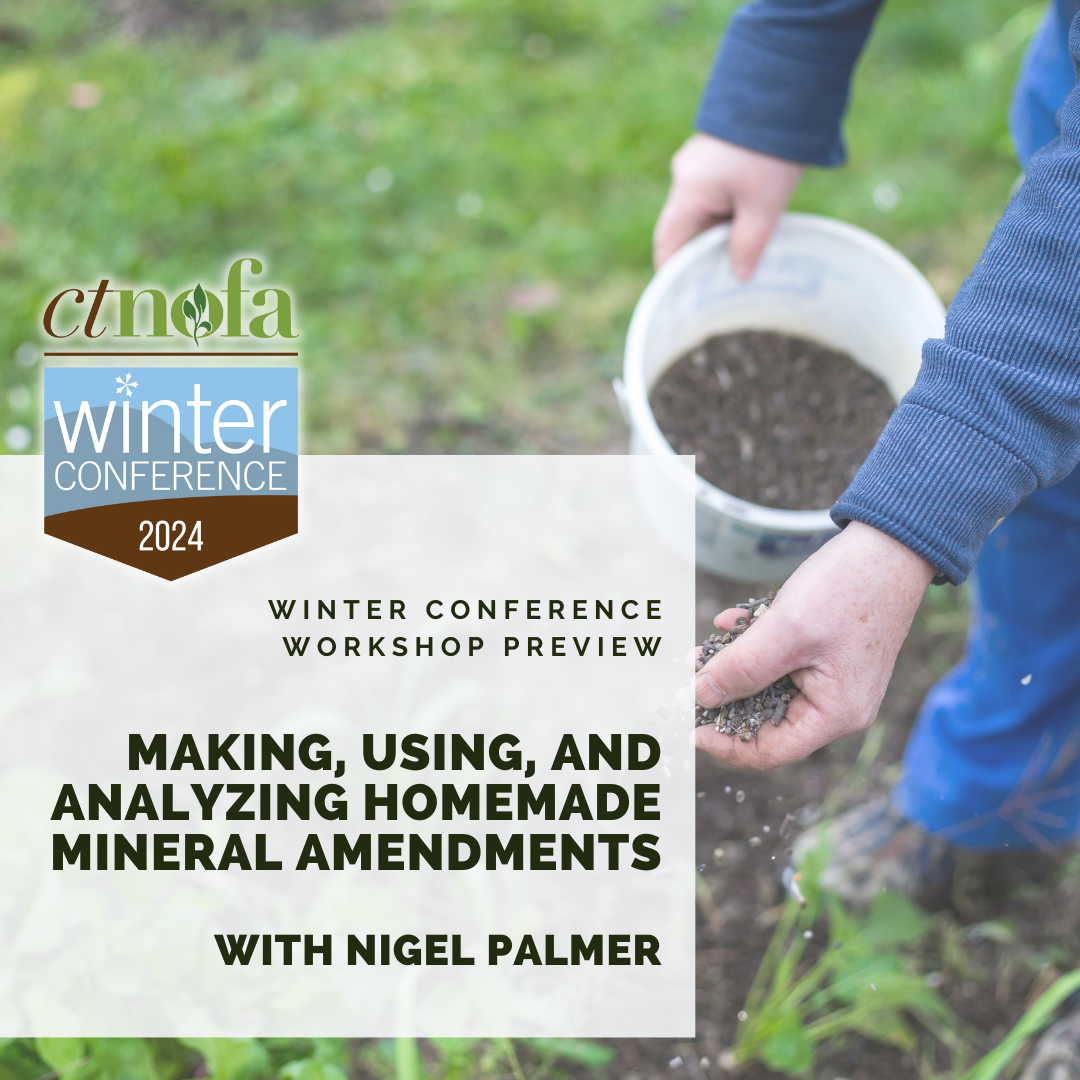
Making, Using, and Analyzing Homemade Mineral Amendments
11:15 AM
NIGEL PALMER | The Institute of Sustainable Nutrition
Tracks: Beginning Farmer, Organic Land Care, Homesteader/Home Gardener, Transition to Organic Farming
Imagine feeding plants and the soil biology sustainably, without the use of chemically made, purchased fertilizers. Homemade mineral amendments can be made in the kitchen or on the farm using simple tools and ingredients often available for free. Analysis of these amendments reveals all 18 of the minerals that plants and the soil biology need in the appropriate proportions. Some extractions reveal high concentrations of specific elements that can be used to facilitate specific phases of plant development. Foliar feeding your plants not only feeds the plant, but also feeds the soil biology through the phloem plant sap pathway. These ideas provide an alternative delivery of plant nutrition that facilitates the transition towards organic growing as well as closing waste gaps.

Treecare for a Changing Planet
11:15 AM
CHRISTOPHER RODDICK
Tracks: Organic Land Care, Homesteader/Home Gardener
This lecture provides an introduction to Conservation Arboriculture, a comprehensive and holistic/organic approach to caring for trees and woody plants, based on recent ecological research and understandings of tree and soil biology, as well as climate research. The presentation will illustrate the benefits of a conservation-oriented practice, as compared to traditional landscape industry arboriculture, which can sometimes have negative, long-term health effects on trees and their surrounding landscapes. For example, most healthy trees do not need to be fertilized and can in fact be harmed by the practice, and yet it continues. We will cover theories as well as specific techniques to make the transition to tree maintenance practices that are based on conservation and ecology.
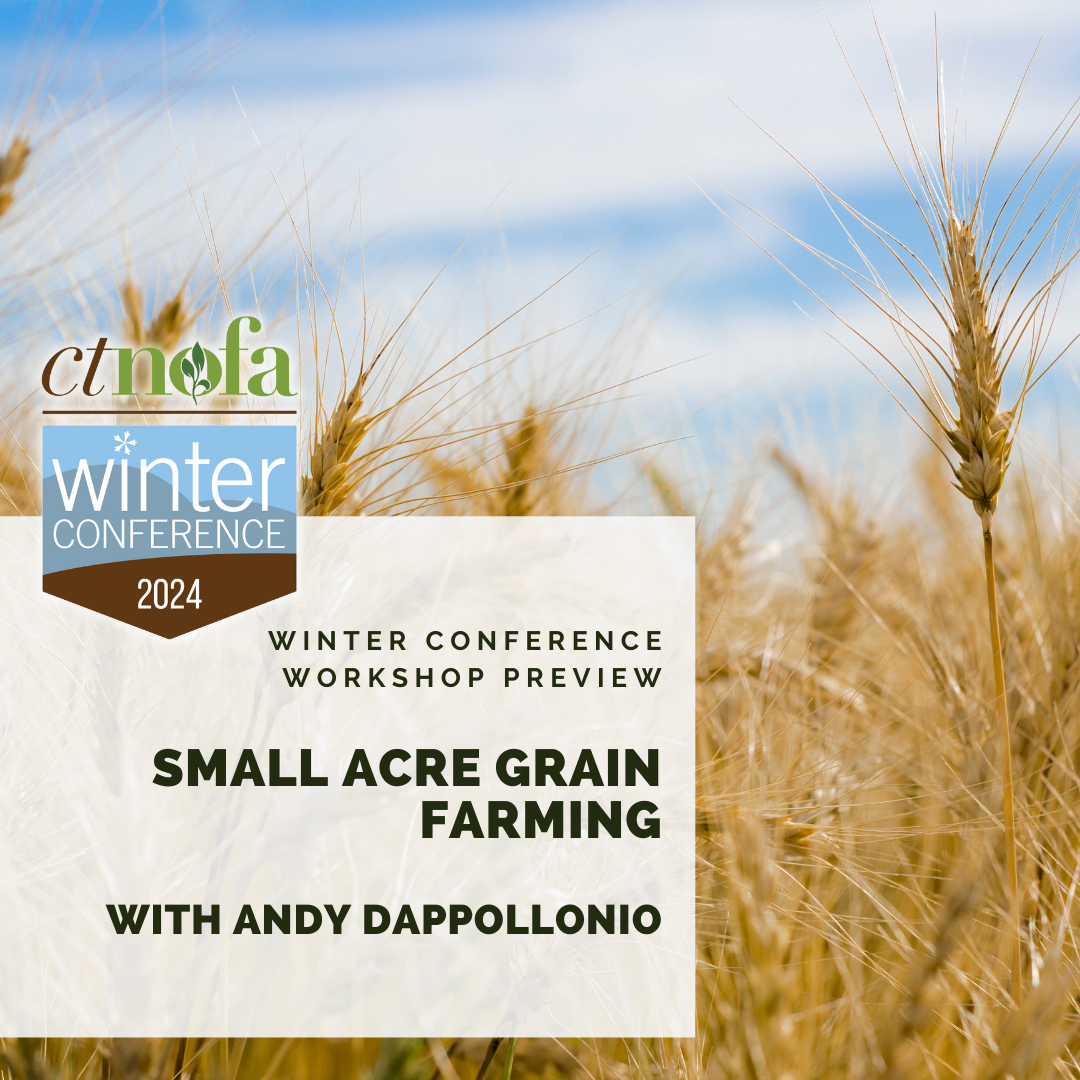
Small Acre Grain Farming
11:15 AM
ANDY DAPPOLLONIO
Tracks: Beginning Farmer
In this workshop, we will present a beginning grain farmer perspective from land acquisition, farm equipment, farming practices, and processing. It will cover a variety of considerations such as deciding on the types of grains to grow, determining your market, critical special equipment, and government regulations. We will present alternatives of grain farming from garden plots to 25 acres requiring machinery.
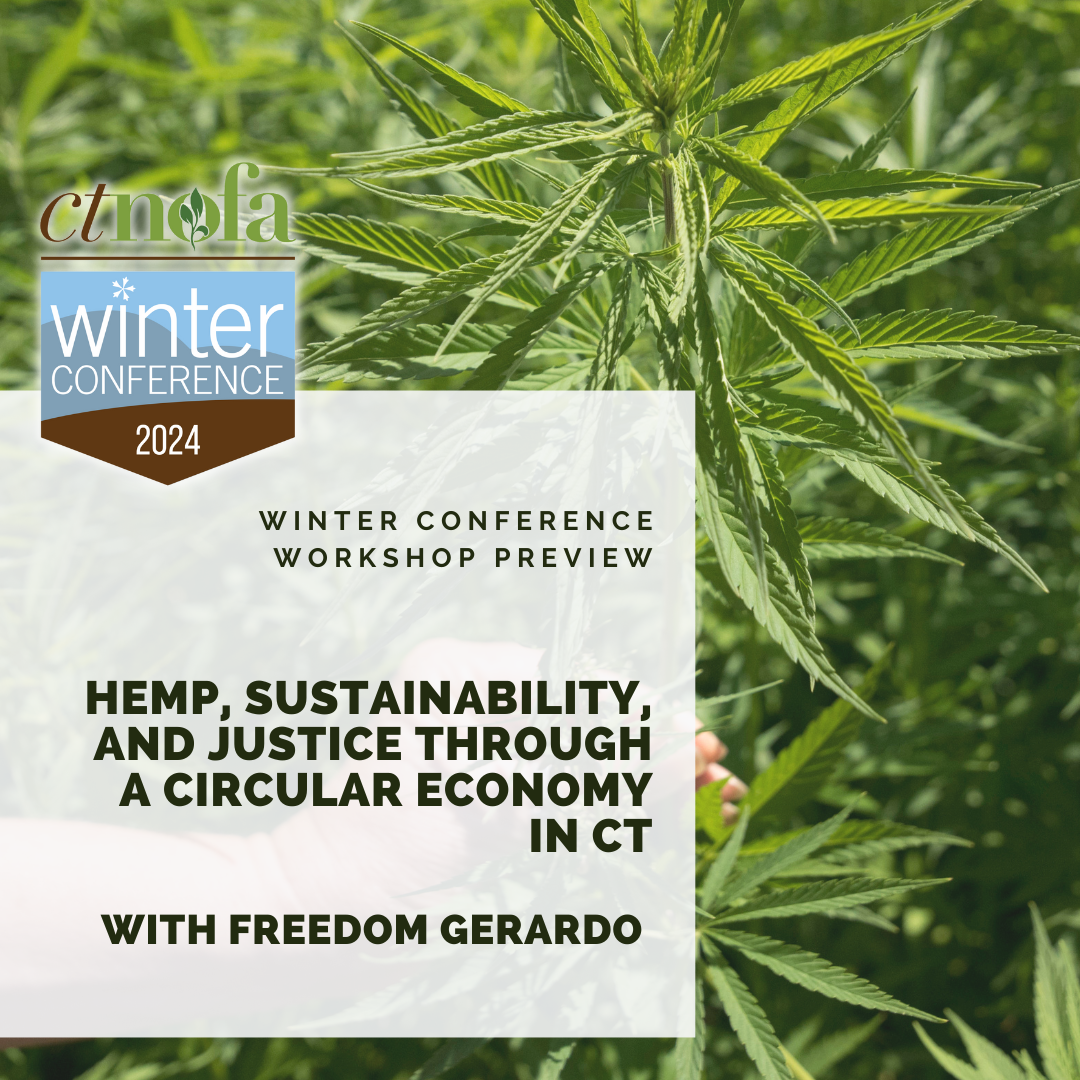
Hemp, Sustainability, and Justice Through a Circular Economy in CT
11:15 AM
FREEDOM GERARDO | SEAmarron Farmstead
Tracks: Beginning Farmer, Policy and Advocacy, Food Justice/Food Security
Hemp (Cannabis sativa, chemotypes II, III and IV) has been cultivated by humans for over 50,000 years for thousands of uses. Hemp cultivars have been bred for high seed (superfood), hurd, and fiber production – providing for many human uses including nutrition, clothing, building materials, rope, and netting. Hemp hurd and lime concrete (hempcrete) is a long lasting (over 900 year old structures are still in use today) and carbon negative structural building material. Hemp textiles, rope, and netting has been used for thousands of years, and were a required crop in the early United States. More recently, hemp oils have been adapted for use as fuels and feedstocks for chemical manufacturing and replacements for plastics. Shifting cultural and legal acceptance of hemp in the United States, and globally, is part of a global revolution in shifting to a green and circular economy – whereby land based products and resources are cycled through numerous interdependent economic sectors – equitably adding value to an ecosystem of human enterprises and co-produced flourishing landscapes. By the end of this workshop, participants will be equipped with the knowledge and insights needed to integrate hemp cultivation into their farming practices. By embracing hemp we can enhance crop diversity and actively participate in the global shift towards environmentally conscious practices, creating a positive impact on both social and ecological fronts. Don’t miss this opportunity to be part of the sustainable agriculture revolution in Connecticut!
session 3 (4:15pm-5:30pm)

Make Room for Natives: Sharing the Environment with Wildlife
4:15 PM
Jackie Algon
Tracks: Beginning Farmer, Homesteader/Home Gardener
The How, What, Where, and Why of planting for wildlife. We will focus on why adding – or replacing – the plants in your yard with natives is so important, the latest best practices in gardening that will help ensure a healthy ecosystem from below ground to the biomass on top, where to find resources that will support your efforts, and when to get started. We will also present a brief history of the Pollinator Pathway and how it can help support your efforts as it does for more than 6000 gardeners.
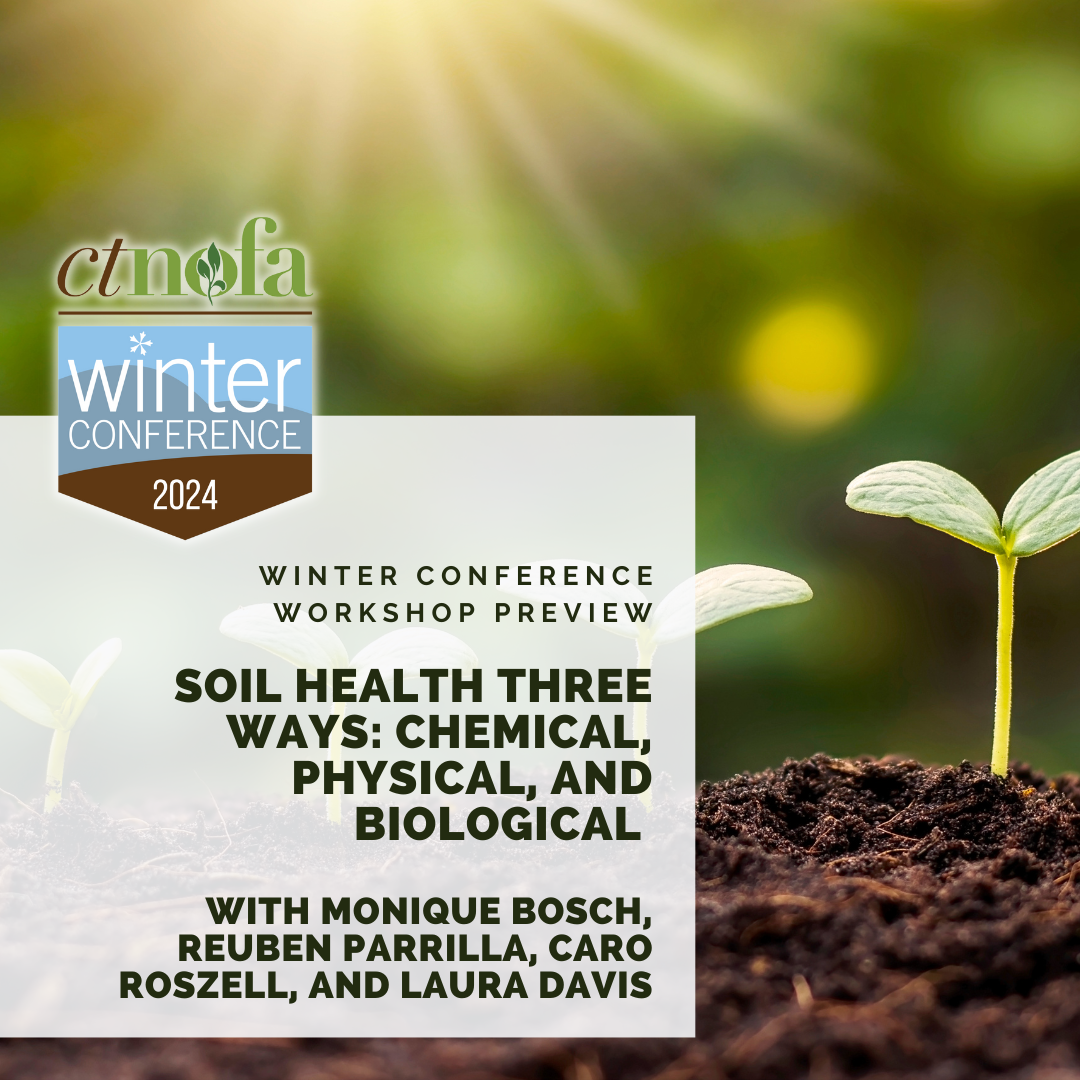
Panel: Soil Health Three Ways – Chemical, Physical, and Biological
4:15 PM
RUBEN PARRILLA, CARO ROSZELL, LAURA DAVIS, and MONIQUE BOSCH
Tracks: Transition to Organic, Beginning Farmer, Homesteader/Home Gardener
Join experts from NOFA and Farmland Trust as we discuss the complex issue of Soil Health. We will break down the various ways we study soil to get a complete picture of how well our soil functions as a vital, living ecosystem that sustains plants, animals, and humans.
Laura Davis will discuss the key takeaways from your chemical soil test, and the most important steps to take to rectify imbalances.
Caro Roszell will share insights into the physical dimensions of soil health. She will talk about surface crusting, compaction, soil structure, and how to assess how soil texture and land management impact these components.
Ruben Parrilla will offer us a view under the microscope to check out the biological life in our soil.
We will come together to answer questions on how these methods of testing can be incorporated into your soil management plan.
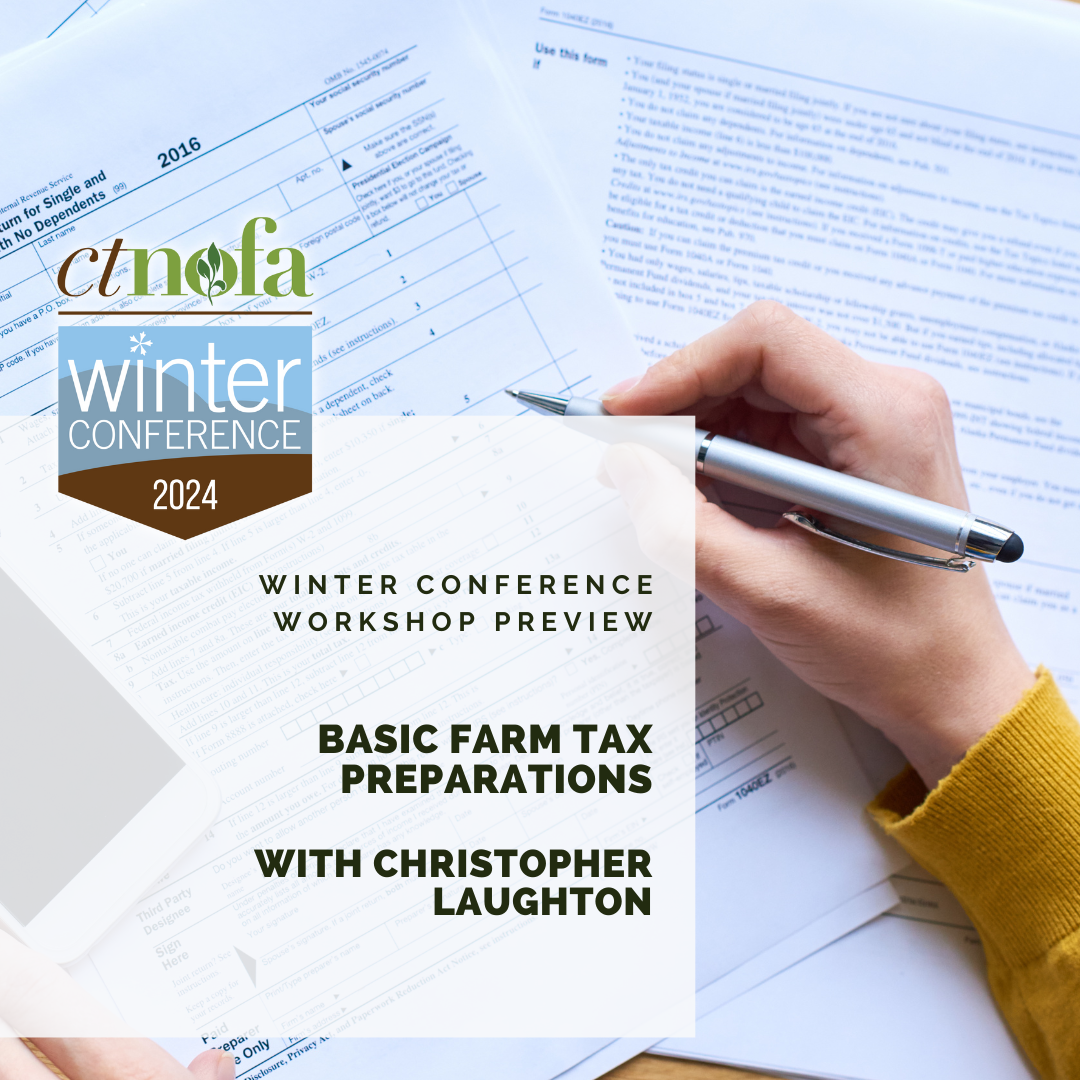
Basic Farm Tax Preparations
4:15 PM
CHRISTOPHER LAUGHTON | Farm Credit East
Tracks: Beginning Farmer
This workshop will cover the basics of farm tax preparation for small farms organized as sole proprietors or partnerships. We will go over the IRS Schedule F form in detail as well as cover the recordkeeping needed to properly file farm taxes.
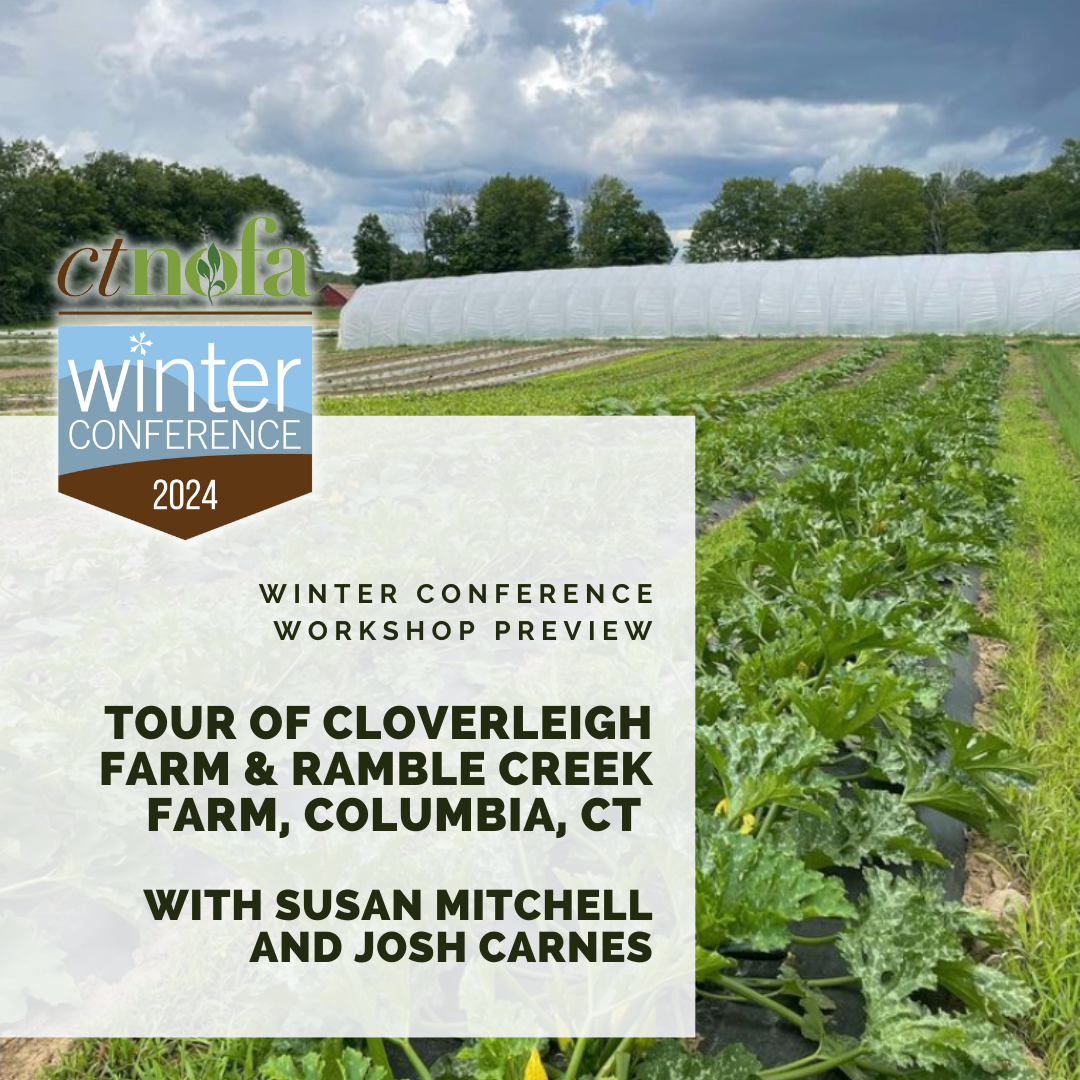
Tour of Cloverleigh Farm and Ramble Creek Farm, Columbia, CT
4:15 PM
SUSAN MITCHELL and JOSH CARNES
Tracks: Transition to Organic Farming, Beginning Farmer, Policy and Advocacy
DUE TO EXPECTATIONS OF HEAVY RAIN ON MARCH 23, THIS TOUR HAS BEEN CANCELED.
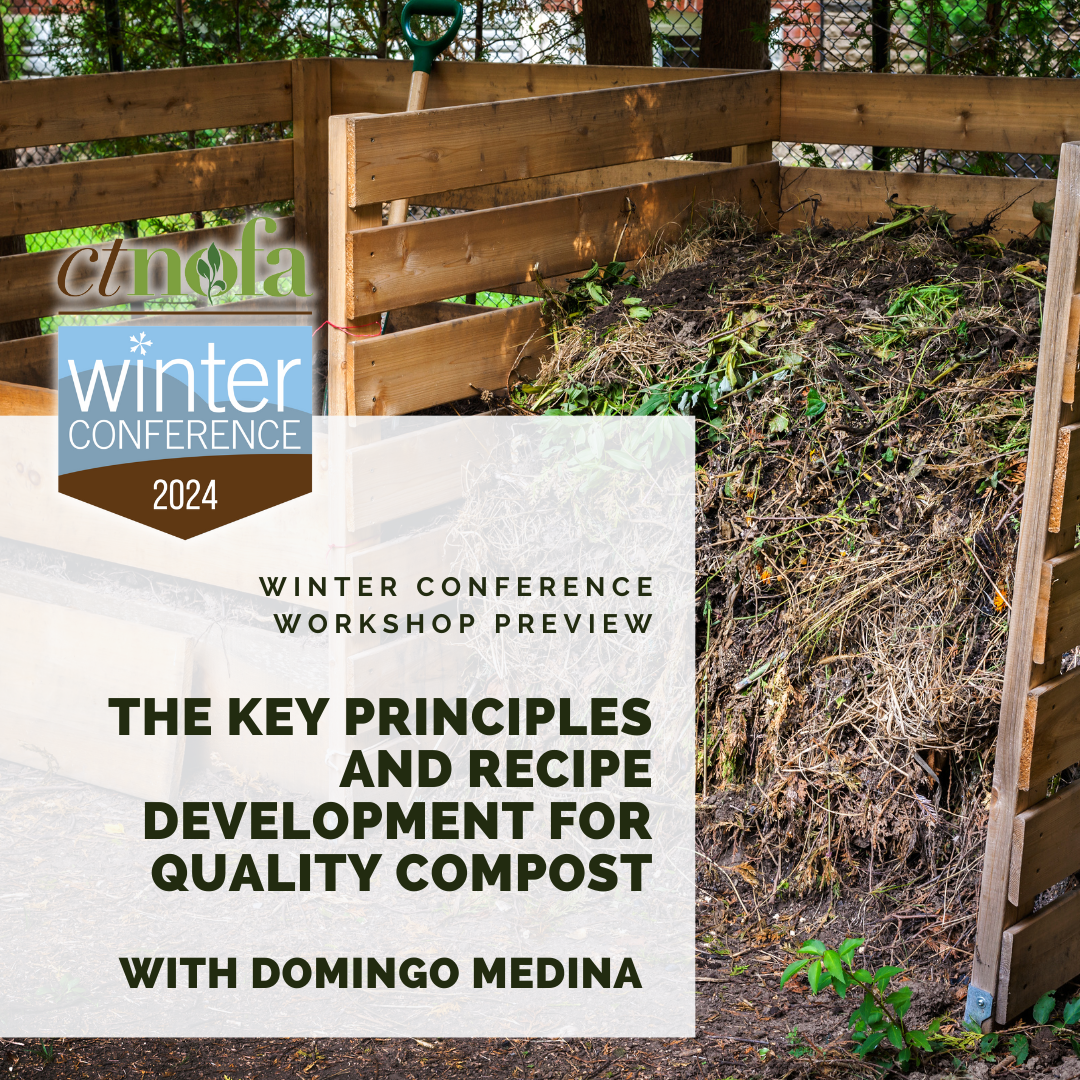
The Key Principles and Recipe Development for Quality Compost
4:15 PM
DOMINGO MEDINA | Peels and Wheels Composting LLC
Tracks: Transition to Organic Farming, Beginning Farmer, Organic Land Care
The production of quality compost for enriching and supporting soils in food production require understanding its science base and adhering to composting principles and best management practices. In this workshop such principles will be discussed, as well as the parameters and workflow for practical composting recipe calculation and development.
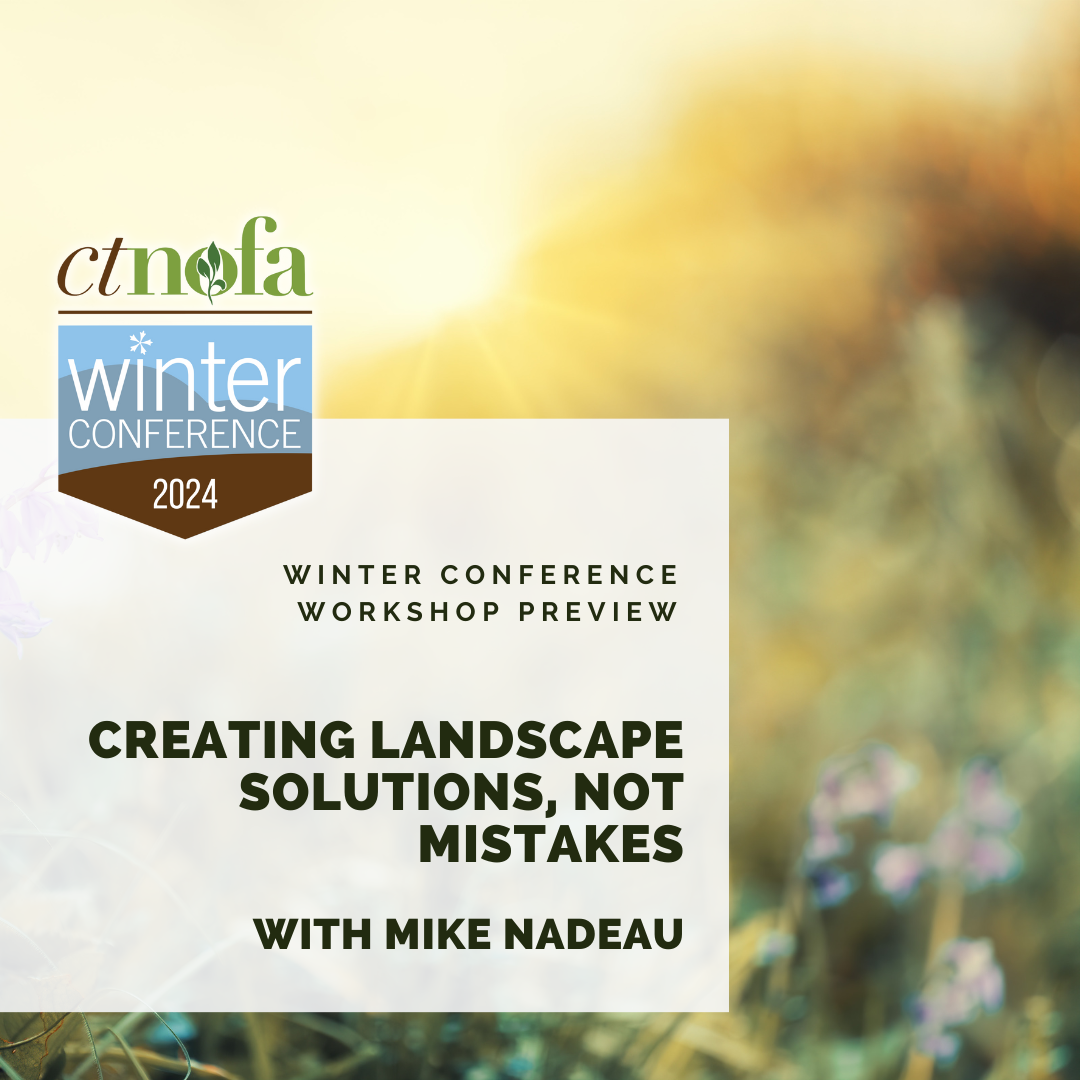
Creating Landscape Solutions, Not Mistakes
4:15 PM
MIKE NADEAU
Tracks: Organic Land Care
We will take a deep look into the prevention of landscape mistakes through wholistic thinking and how thinking differently can result in novel solutions for commonplace challenges. Discussion of native vs. nativars vs. non-native plants; specific methods and materials for controlling invasive plants organically; meadowscaping and restoration. Finally, an open dialog about the mystical aspects of our chosen profession that transcends science and the nuts-and-bolts mindset that precludes a deeper contemplation into what we do and why.
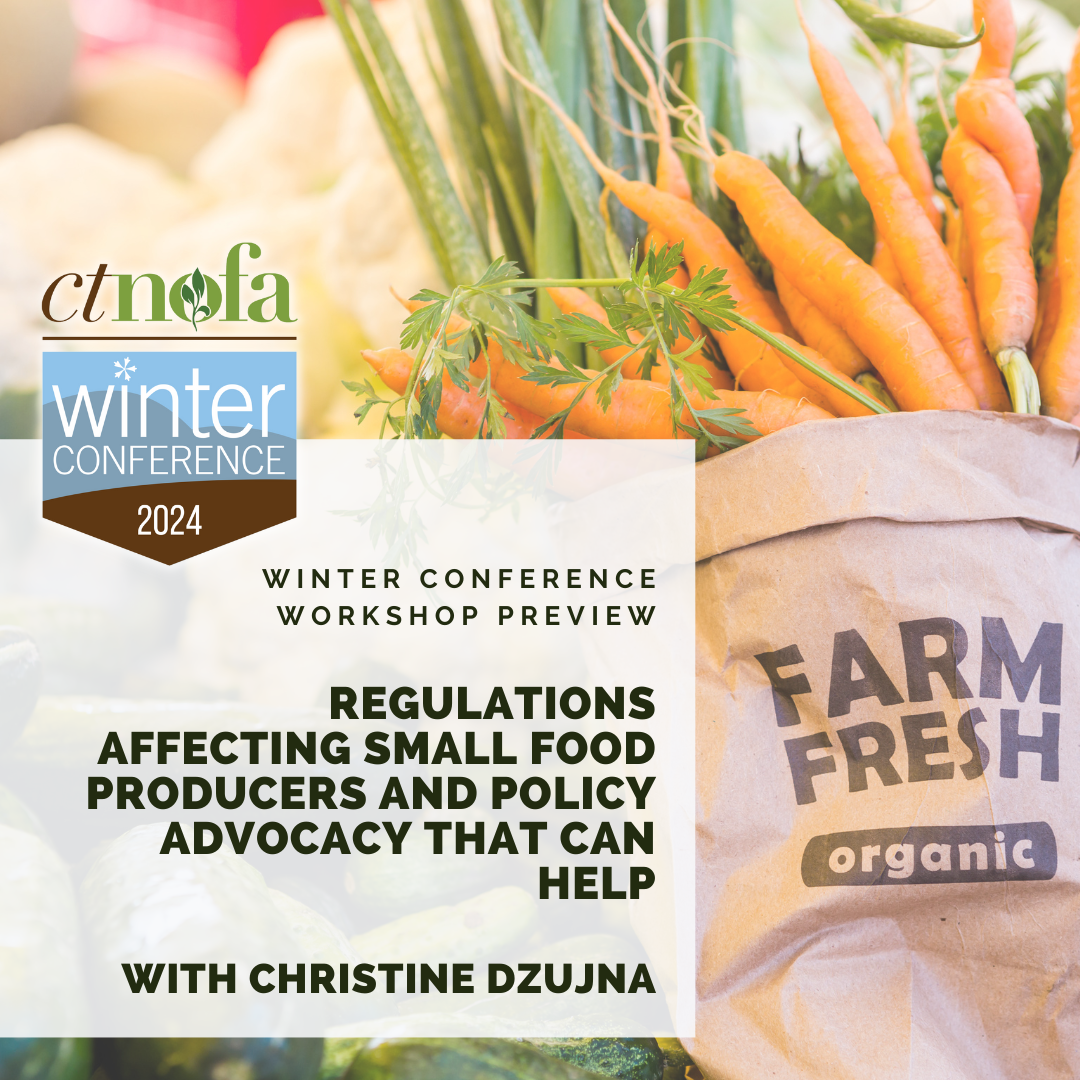
Regulations Affecting Small Food Producers and Policy Advocacy That Can Help
4:15 PM
CHRISTINE DZUJNA | Farm-to-Consumer Legal Defense Fund
Tracks: Policy and Advocacy
We will explore key federal, state, and local meat, dairy, produce, poultry, cottage food, etc. laws and regulations that impact small food producers, and the legal solutions that can help. We will also explore legislative, policy, and advocacy tools that seek to expand food freedom choices for everyone.
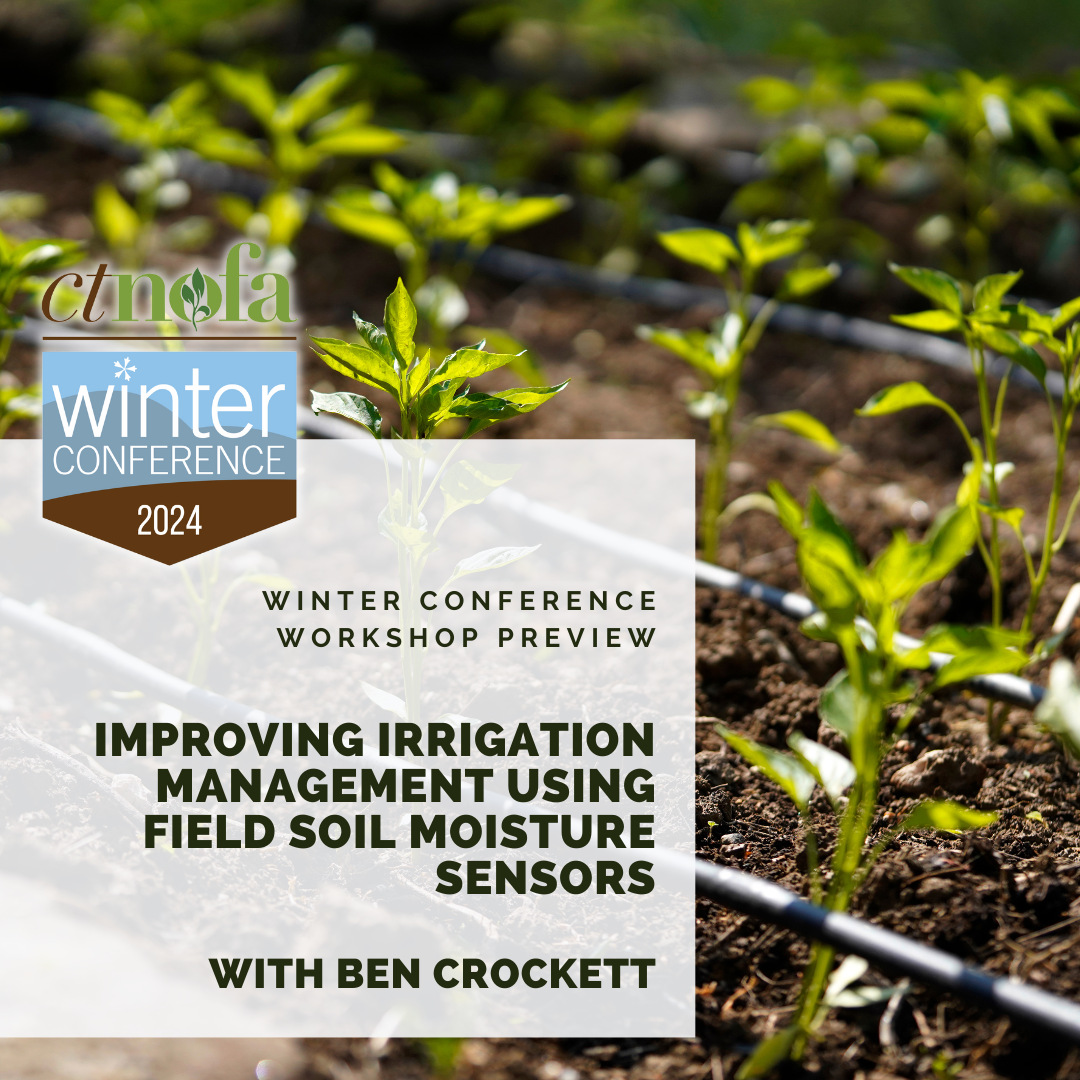
Improving Irrigation Management Using Field Soil Moisture Sensors
4:15 PM
BEN CROCKETT | Berkshire Agricultural Ventures
Tracks: Transition to Organic Farming, Beginning Farmer, Organic Land Care, Homesteader/Home Gardener
Increasing changes in weather patterns often means relying more on irrigation to maintain crop quality and production. Irrigating can put a strain on labor, farm water systems, natural resources, and profitability. This session will introduce the technology of soil moisture sensors, how their integration with crop systems can improve water resources management without sacrifices to crop production, and reflections from trialing soil moisture sensors for 2023 ginger and turmeric production at Shaker Creek Farm.
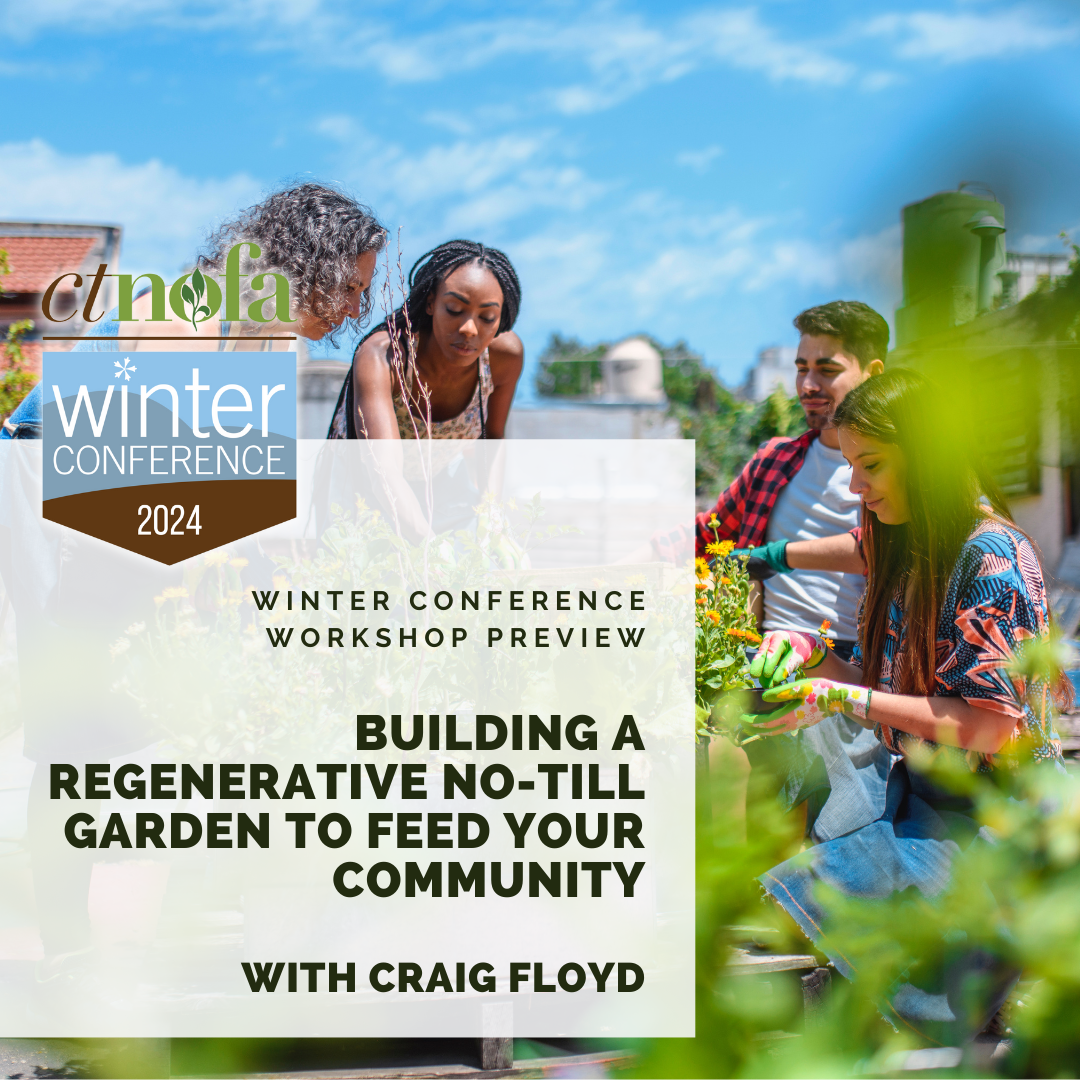
Building a Regenerative No-Till Garden to Feed Your Community
4:15 PM
CRAIG FLOYD
Tracks: Food Justice, Food Security
THIS WORKSHOP HAS BEEN CANCELED.

Use Your Voice and Vote to Advocate for the Legislation You Want
4:15 PM
DR. KIMBERLY STONER | CT NOFA Director of Advocacy
Tracks: Policy and Advocacy
State and Federal legislators, and other elected officials – their job is to represent you and your community. Make sure they know what you want. The only way to get the policies we want is to use the power of our voices and organize others to do the same.


